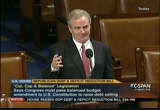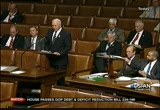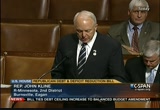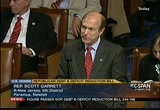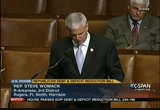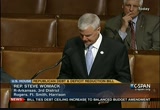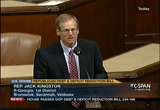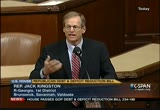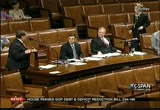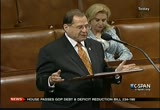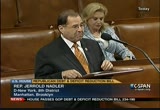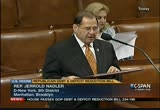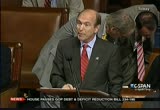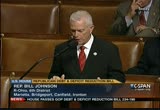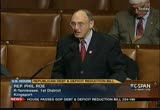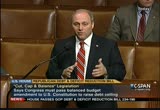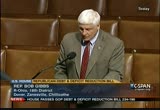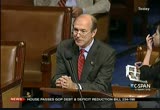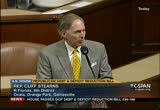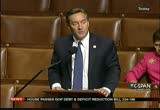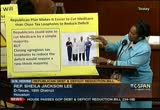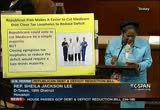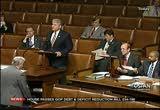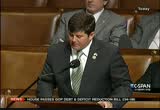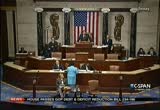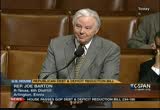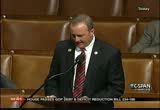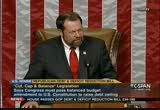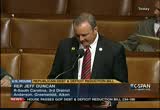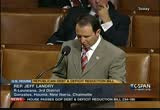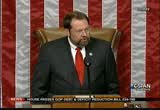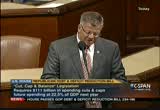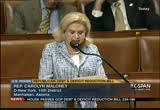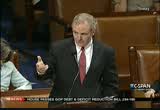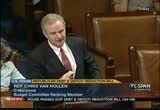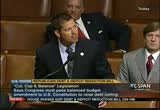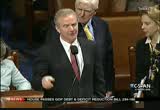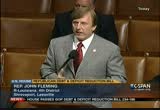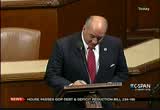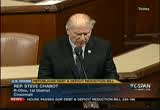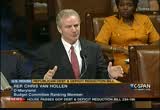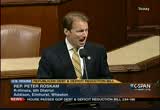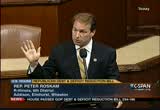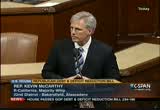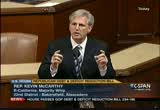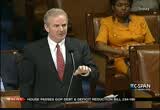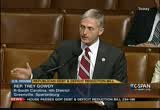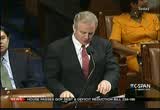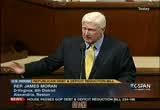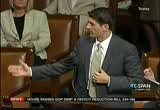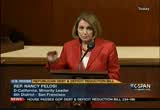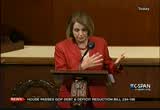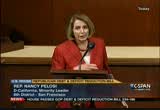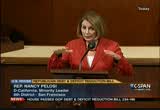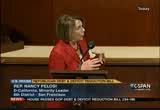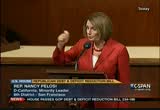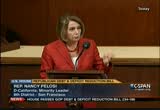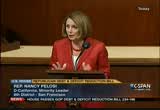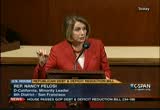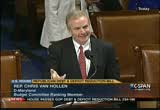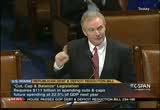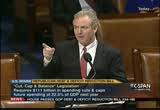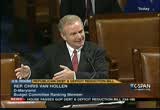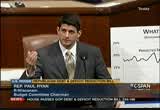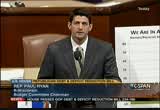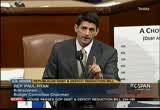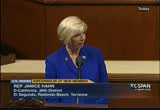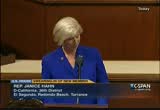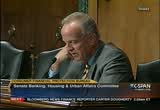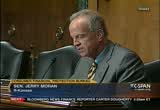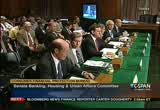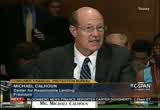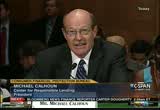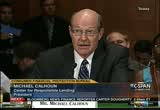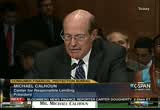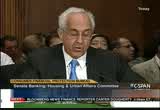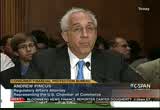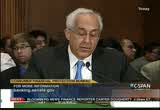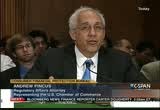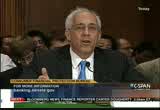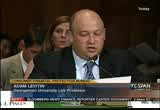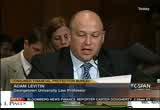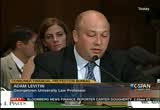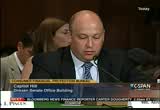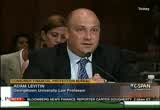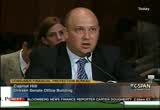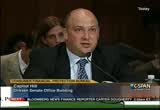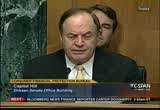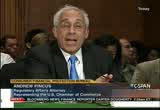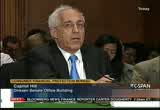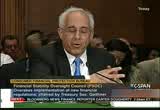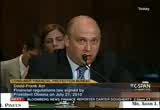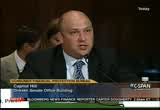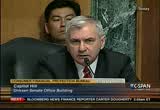tv Capital News Today CSPAN July 19, 2011 11:00pm-2:00am EDT
11:00 pm
anti-democratic provisions that said, you need 2/3 in order to close special interest tax loopholes for the purpose of deficit reduction or to say we are going to decide now for all time that we have to balance our budget at 18% at g.d.p. rather than at the will of the american people. how is the time currently allocated? the speaker pro tempore: the gentleman from new jersey has 17 1/2 minutes with an additional hour. and the gentleman from maryland, 51 1/2 minutes. the speaker pro tempore: the gentleman from new jersey, mr. garrett. mr. garrett: i yield one minute to the the gentlewoman from the gentleman from minnesota. mr. kline: i rise in strong
11:01 pm
support of h.r. 2560, cut, cap and balance act. the severity of our nation's fiscal crisis cannot be overstated. more than 14 million americans are looking for work. meanwhile federal spending continues at an unprecedented pace with an average of $4 billion added to our country's debt every day. we need to encourage economic growth and investment. instead, leaders on the other side of the aisle are pushing reckless policies, more red tape and taxes to pay for their irresponsible spending spree leaving job creators frozen by uncertainty and fear and risk our future prosperity. at a recent round table, a small business owner told me, quote, the government is out of control, it's too big and i don't like it, closed quote. well, i don't like it either and it's costing our country jobs. it's time for washington to do what's right. we need to make the tough choices necessary to get our nation's fiscal house in order.
11:02 pm
no one said it would be easy, but it is certainly necessary. the legislation before us will end unsustainable spending and put this nation back on a fiscal path. i urge my colleagues to support it. i yield back. the speaker pro tempore: the gentleman yields back the balance of his time. the gentleman from maryland continue to reserve? mr. van hollen: i reserve. the speaker pro tempore: the gentleman from new jersey. mr. garrett: regarding what sort of amendment that thomas jefferson may have been looking for today whether we would be looking for in what we call a super majority or what have you, jefferson would be going even further than what we are doing here today and say that congress should not have the ability to borrow at all. the amendment we are putting forward would give us greater flexibility in time of emergency, in time of war, that congress can take it upon themselves to borrow. jefferson understood that congress, just like the businesses and families at the time needed to live within their
11:03 pm
means and he saw it as i am moral to take a responsibility of this generation and place it on future generations. with that, i will yield two minutes to the gentleman from arkansas. the chair: the gentleman from arkansas. mr. womack: i have had the pleasure of representing arkansas' third district and i can still hear the voices of those people who sent me here. they said, steve, you have to go to washington and you have to cut spending. you have to empower the private sector. you have to reduce the size of government. you have to get to washington and help put us back to work. those same conversations at home at the kitchen table, people discussing their personal budgets, saying to me that i have to live within my means,
11:04 pm
why doesn't washington? mr. speaker, to each of these comments, i say we have an answer. it's a trifecta, if you will called cut, cap and balance. i realize i have been here a short time but i know full well how washington works and i know that this concept is foreign to the many people who have been here down through the years. if you look around and take an objective view, you know the only way to bring legitimate control to the irresponsible fiscal behavior of washington, d.c., the only way to restore the integrity of this chamber, to restore the confidence in the people we serve is to make it constitutional, a balanced budget amendment. no gimmicks, mr. speaker, no hollowed promises, simple language that simple americans can wrap their heads around, a constitutional amendment for this country to balance its
11:05 pm
books. and i yield back. the speaker pro tempore: the gentleman yields back the balance of his time. the gentleman from maryland. mr. van hollen: i reserve. the speaker pro tempore: the gentleman from new jersey. . mr. garrett: at this time, the gentleman from tennessee, from -- there he is. from georgia for one minute, please. the speaker pro tempore: the gentleman from georgia is recognized -- mr. kingston: can i have 30 seconds for the long stay? can i get a minute and a half? mr. garrett: we will yield main and a half. mr. kingston: i thank the gentleman from new york. i appreciate my friend from new jersey. during this eight years as president, president bush increased the national debt $3 trillion. we spent too much money. but not to be outdone in a three-year period of time president obama has increased the national debt $5 trillion, a 56% increase.
11:06 pm
and then he turns around and lectures middle class american families struggleing -- families, struggling families to eat their peas. he offers nothing but a phony budget that even failed in the democrat-controlled senate 97-0. harry reid voted against his budget. the president owns this economy. not cheney, not george bush, it's the president. he owns the skyrocketing debt, he owns the 15 million unemployed, he owns the failed stimulus plan. president obama owns the extended bush tax cuts because it was him who extended them two years. and now in our time of great fiscal crisis, when america needs leadership, he's absent. the republicans in the house are offering a plan and i understand the democrats don't like it, that's good because sometimes the two parties have to battle it out and you get a better product from it. but you can't do it when the democrats aren't offering a plan.
11:07 pm
we will pass this plan today and i hope harry reid and the democrats will pass the plan and we can get together and i hope the president decides to offer a plan and maybe we can look at his and maybe out of the three possibilities we can do what's best for the american people, but we can't do it unless the president decides to engage and take on the role of leader and with that i yield back the balance of my time. the speaker pro tempore: the gentleman yields back the balance of his time. the gentleman from maryland. mr. van hollen: thank you, mr. speaker. once again the president had a plan to reduce the deficit by about $4 trillion over 10 years, $3 in cuts, $1 in revenue, our republican colleagues walked away from the table because they didn't want to ask $1 of deficit reduction from closing special interest tax loopholes. with that i yield three minutes and 15 seconds to the distinguished member of the judiciary committee, mr. nadler. the speaker pro tempore: the gentleman from new york. mr. nadler: thank you, mr. speaker. mr. speaker, many of our colleagues on both sides of the aisle would not be here today if
11:08 pm
president jefferson had not borrowed to finance the louisiana purchase purchase. -- purchase. mr. speaker, this bill promises all the fun of a constitutional amendment without actually amending the constitution. it simply says that the united states should default on our debts and destroy our economy if we don't amend the constitution. if we default on our debts we will do more damage to our economy than large deficits, tax increases and da conian cuts combine -- draconian cuts combined. right now we enjoy low interest rase rates because we're the most stable, reliable country in the world. even though we are certainly wealthy enough to pay our debts, nothing else will matter. interest rates will climb, homeowners and businesses will be pushed out of the credit markets, the stock market will crash. never before in the history of this country has anyone been irresponsible enough to play chicken with our full faith and credit. never. we know how to balance the budget because we've done it
11:09 pm
before. in the not too distant past we managed working with president clinton not only to balance the budget but to run surpluses an begin paying down the debt. unfortunately president bush and the republican congress managed to turn record surpluses into record deficits in record time. rather than admit to serious republican economic mismanagement and finding responsible solutions, we get this dusted-off thing from the past. the one that abolishes medicare and turns medicaid into a block grant. i ask the sponsor of the balanced budget amendment, the gentleman from virginia, how he thought this could be done? he answered that the republican study committee budget, which is even more radical than the ryan budget, would be in balance in just nine years. that's what we're voting for today. an accelerated version of the republican study committee budget. anyone voting for this should be prepared to go home and explain that vote including republican members who voted against the study committee budget. economists have long known that
11:10 pm
in good times you should balance the budget and pay down the debt but that in times of recession when tax revenues plummet and the economy contrasts you have to spend money in unemployment and to put people back to work. you must run a deficit to get the economy going again. the balanced budget amendment would force us to do the exact opposite and turn every recession into a depression. and this constitutional amendment, there's a whole lot more than a required balanced budget. many of its provisions cement into the constitution the policy preferences of the current majority and bind our children and grandchildren to those preferences. the 2/3 requirement for example to increase revenues would have the effect of allowing special interest tax loopholes to be slipped into law with a majority vote but would require a soup mar jort to reveal them -- a super majority to repeal them. the amendment would also require a 2/3 vote for any budget that exceeds 18% of g.d.p. the c.b.o. tells us that outlays of average of close to 21% of
11:11 pm
g.d.p. over the past 20 years. it did not drop below 18% since 1966. that is since the enactment of medicare. regardless of what other parts of this bill may say, there is no way to meet these restrictions without destroying medicare, medicaid, social security, veterans programs and military preparedness. can i have another 15 seconds? mr. van hollen: i yield to the gentleman 10 seconds. mr. nadler: thank you. no amount of rhetoric will change it. the real problems that tax revenues have declined from 20.5% of g.d.p. in 2000 to 14% of g.d.p. because we no longer tax the millionaires, the billionaires and the large corporations the way we used to. let's start doing that and we can have a balanced budget without writing any constitutional amendments which promise balanced budgets without showing how they do protect the millionaires from paying their fair share. i yield back the balance of my time. the speaker pro tempore: the gentleman's time has expired. the gentleman from new jersey. mr. garrett: we're also reminded that jefferson said that the principle of spending money today that we don't have be paid
11:12 pm
for by posterity is but swindling future generations. something this republican party does not wish to do. with that i yield one minute to the gentleman from ohio. the speaker pro tempore: the gentleman from ohio, mr. johnson. mr. johnson: mr. speaker, i rise today in strong support of h.r. 2560, the cut, cap and balance act. last november the american people sent a clear and resounding message -- cut off the nation's credit card and stop spending money we don't have. today we're doing that. this act makes immediate spending cuts and forces the federal government to do what americans all over this country are doing, living within their means. this legislation also begins to cap federal government spending at levels that are historically sustainable to ensure vibrant economic growth. finally this measure forces the federal government to do what to most americans is simply plain, common sense. spend only the amount of money that you have. a balanced budget amendment is
11:13 pm
long overdue. republicans have heard the american people's call to action to reduce spending and that is why i strongly support this measure. i urge my colleagues to vote in favor of the cut, cap and balance act and with that i yield back the balance of my time. the speaker pro tempore: the gentleman yields back the balance of his time. the gentleman from maryland. mr. van hollen: mr. speaker, i reserve. the speaker pro tempore: the gentleman reserves the balance of his time. the gentleman from new jersey. mr. garrett: at this time i yield one minute to the gentleman from texas and that's just the way it is. >> i thank the gentleman for yielding. i rise today in support of the cut, cap and balance act because american families deserve to have a government that lives within its means just like they do. our national debt has grown in excess of $14 trillion, that's more than $46,000 for every man, woman and child in this country. and we continue to borrow roughly 40 cents of every dollar we spend. this is a path to financial ruin, we will leave the next generation with a less prosperous america than the one we inherited.
11:14 pm
mr. roe: balancing our budget would have a devastating affect on our economy. it's hard to believe. the cut, cap and balance act keeps the promise to cut spending while also granting the president's request for a debt limit increase. by cutting spending $111 billion the first year alone, capping future spending and laying the groundwork for a balanced budget amendment, this package will save $5.8 trillion over the next 10 years. this bill is nothing more than good, old-fashioned common sense and i urge my colleagues to support this. i yield back the balance of my time. the speaker pro tempore: the gentleman from tennessee yields back the baffle his time. without objection, the gentleman from -- balance of his time. without objection, the gentleman from virginia, mr. moran, will control the time on the minority. the chair recognizes the gentleman from virginia. mr. moran: we will reserve the balance of our time. the speaker pro tempore: the gentleman reserves. the gentleman from new jersey. mr. garrett: the gentleman is recognized for one minute. mr. scalise. the speaker pro tempore: the gentleman from louisiana. mr. scalise: thank you, mr. speaker. i rise in support of cut, cap and balance and if you look at what american families have been
11:15 pm
telling us for the last few years, during these tough economic times what they've been doing is they've been cutting back, they've been tightingen -- tightening their belts and they sit around the kitchen table and figure out how to balance their budget and live within their means and yet today on the other side all you've seen is a parade of members coming criticizing the concept of a balanced budget. actually calling it extreme, radical. imagine that. only a big spending washington liberal could think it would be radical to require washington to start living within its means like families have been doing for years. and so frankly american families would say it's about time, welcome to the party. and instead some people think you can just live in this fantasy land where you can keep tax, taxing, spending, borrowing money from china and act like the day of wreckening never is never going to come and kick the -- wrenging is never going to come and kick the can down the road. it's time to say enough is new. we're going to deal with our problems nod. we're going to set priorities today and do the tough things
11:16 pm
people sent us to do and that means cutting, capping and balancing the federal budget. i yield back. the speaker pro tempore: the gentleman's time has expired. without objection, the gentleman from maryland is back and is recognized. mr. van hollen: thank you, mr. speaker. again, the choice is not whether we put in place a plan to reduce the deficit and balance the budget. the issue is how we do that. that is the difference here. with that i would reserve. the speaker pro tempore: the gentleman reserves the balance of his time. the gentleman from new jersey. mr. garrett: the gentleman from ohio for one minute is recognized. the speaker pro tempore: the gentleman from ohio, mr. gibbs. mr. gibbs: thank you, mr. speaker. i rise today in strong support of cut, cap and balance. out-of-control spending in the federal government has driven our country to the brick of -- brink of financial meltdown. our nation's debt crisis was easily predictable. in recent years america has watched as the side of the federal government has ballooned and deficit spending reached dangerous levels. and yet warnings from congress, congress stuck with business as usual, more spending, more
11:17 pm
regulations and bigger government. it's time to put an end to business as usual for the good of the country. our country needs it, the american people demand it and the future of our grandchildren depend on it. this legislation puts us on a path of fiscal responsibility, brings certainty and will restore private sector confidence. the naysayers say we can't do this, they argue for tax increases on our job creators. this will unleash the private sector and result in more revenues to ensure strength and social security -- strength in social security and other programs. just raising the debt ceiling without spending cut reforms, according to moody's and standard&poors will lead to a down grade of u.s. paper and a downyield spiral, higher interest rates, higher taxes and less opportunities. i urge the support of this and cut spending now instead of six to 10 years from now. the speaker pro tempore: the gentleman's time has expired. the gentleman from maryland. mr. van hollen: i reserve. the speaker pro tempore: the gentleman reserves. the gentleman from new jersey. mr. garrett: with that i yield one minute to the gentleman from
11:18 pm
florida who the white house says that leadership is not simply proposing a bill to vote up or down, we recognize that the white house is not giving us any plan of leadership so far in this issue. the speaker pro tempore: the gentleman from florida. >> i ask unanimous consent that my speech be made part of the record. the speaker pro tempore: without objection. >> it's been said before that the united states government owes close to $14.3 trillion. it's estimated by the c.b.o. reveals that by the year 2021 the government will spend 100% of every dollar in revenue on entitlements, simply raising the debt limit to $16.3 trillion without comparable spending reduction is irresponsible at best and catastrophic for our nation and worse. mr. stearns: facing our nation's debt onto the backs of our country's children and grandchildren is irresponsible. comparable reductions would be in the amount of $2 trillion. but as that does not even cover the interest on the debt, a $4
11:19 pm
trillion spending reduction would be appropriate. and that's what we should be working on. today we must ask ourselves, is this blessed country of ours disciplined enough to solve the debt problem through austerity and productivity? i think we can. i believe we can. but only if we break from the tradition of spending and raising our debt limit. instead we must pass h.r. 2560. the cut, cap and balance act. the speaker pro tempore: the gentleman's time has expired. the gentleman from maryland. mr. van hollen: mr. speaker, i reserve. the speaker pro tempore: the gentleman from new jersey. mr. garrett: with that i yield one minute to the gentleman from north dakota. the speaker pro tempore: the gentleman from north dakota. >> thank you, mr. speaker. we've been down this road before. our country faces unprecedented debt. bergburg the house has worked to cut spending and reduce the -- mr. berg: the house has worked to cut spend and reduce the deficit but the obama administration would rather raise taxes and mislead americans with scare tactics rather than support these commonsense solutions.
11:20 pm
. we cannot do the same thing over and over again and expect a different result. americans have tightened their belts and have made the tough choices. it's time for washington to do the same. our financial situation is a mess. it's going to be a long road to get our country back on track. but it's clear we can begin right here. we need to cut the spending. we need to cap the growth in government and we need to balance the budget. i yield back. the speaker pro tempore: the gentleman yields back the balance of his time. the gentleman from maryland. mr. van hollen: thank you, mr. speaker. i would remind my colleagues that this provision they're talking about, the constitutional proposal that came out of the judiciary committee would prohibit the congress from balancing the budget at 13% of g.d.p. expenditures. it would say you cannot not make that choice. it would say you have to reach a
11:21 pm
2/3 hurdle to reduce the special interest tax breaks for the purpose of deficit reduction. we keep hearing about this balanced budget amendment without any mention from our colleagues that they put these two devices into the constitution that would limit our ability to balance the budget in a balanced way. and with that, i reserve. the speaker pro tempore: the gentleman reserves the balance of his time. the gentleman from new jersey. mr. garrett: would that we have the problem of this congress the last two years trying to balance the budget, stimulus spending, obamacare and the budget deficit should we look to the other side of the aisle? that's not the case. and that's the reason why the need to try and constrain our spending, legislative caps tomorrow and going forward in the future with a constitutional
11:22 pm
balanced budget amendment. i yield one minute to the gentlelady from north carolina. the speaker pro tempore: the gentlelady from north carolina. mrs. myrick: the possible default of the federal government presents a near term problem that could have disastrous effects on the short-term, on our economy. but the bigger problem is long-term, because washington has been spending too much money for too darn long. borrowing 40 cents of every dollar we spend, most of it from china. this bill cuts spending, cap and then balance the budget is something that needs to be done and we can't keep kicking the can down the road. you have heard it before, but it's true. the responsibility is on us to do the right thing for tomorrow for our families and everybody else. we balanced the budget almost some years ago.
11:23 pm
it's not impossible. it can be done if we have the courage to do it. 49 out of 50 states do it. so we need to remember there's no such thing as government money. it's the taxpayers' money and it's our job to be responsible stewards and we need to step up and take responsibility and pass this bill. the speaker pro tempore: the gentleman from maryland. mr. van hollen: i thank you, mr. speaker. that's right, during the clinton administration when they took a balanced approach, we did run surpluses and i yield two minutes to the gentlelady from texas, ms. jackson lee. the speaker pro tempore: the gentlelady from texas. ms. jackson lee: thank you very much, mr. speaker. and i thank the distinguished member of the budget committee as well for the great work that
11:24 pm
he has been doing. as i listen to my friends discuss this question of being responsible, i want to at least announce breaking news that our friends in the other body have come up with a semi-solution on revenue and on the question of how we would cut. they are seeking to be responsible. and today in this body, we are not. i heard a tutorial about the green light and red light, which as you are a member, green is yes, and no comes up red. what the red will mean is to stop the insanity, to stop the loss of our moral compass, the responsibility to pay our bills. what the red light will mean is that we, in fact, would be not
11:25 pm
paying the bills of our family. we wouldn't be paying social security. interest rates will spike. the u.s. dollars would decline and our credit would literally go out the door. that's what being without responsibility is what we are planning to do. then, if i could have the other one, please. then we will lose the ability to pay our medicare. and so don't be fooled by the green light tutorial. we frankly are going to lose our way. we'll close hospitals and won't have the ability to provide for our seniors and these are the very persons that my colleagues over here believe they are helping. but the main point i want to emphasize very quickly is that the constitution of the united states already says that the
11:26 pm
validity of the public debt of the united states in the 14 amendment section 4, shall not be questioned. let me tell you today that a balanced budget amendment will destroy the united states and will not allow us to pay for those in need. tap dance, losers' club,. that's what this bill is. tap dance, losers' club and bust the benefits. the speaker pro tempore: members are advised to heed the gavel and concede the time yielded by the managers of the floor. the gentleman from new jersey. mr. garrett: what the leader on the other side said, whether members have read the bill. if they did read, cut, cap and balance actually does those three things and allows us to pay the bills at the same time. with that, i yield one minute to the gentleman from florida. the speaker pro tempore: the gentleman from florida.
11:27 pm
>> mr. speaker, for the last 30 years, i have spent my life as a husband, small business owner and legislator. common sense is not so common here in washington, d.c. as a husband, it would be irresponsible to buy a new car or boat if my family couldn't make food payments or mortgage payments. i didn't raise revenues on my customers, i cut back my expenses. as a legislator, we can operate a state and you don't see floridians running on the street. you see florida living within its means. those opposed to this plan are frightend and they know any cuts agreed to and a balanced budget and know it brings spending reductions and force government in the future to get an agreement of the whole family. a balanced budget amendment is
11:28 pm
common sense sm the american people are watching and their patience is wearing thin. i yield back. the speaker pro tempore: the gentleman yields back the balance of his time. the gentleman from maryland. mr. van hollen: i reserve. the speaker pro tempore: the gentleman from new jersey has 2 1/2 minutes left. mr. garrett: yield one minute, please. the speaker pro tempore: the gentleman is recognized. >> thank you, mr. speaker. with a record debt level of $14.2 trillion and unemployment at 9.2% and spending out of control, americans are searching for answers, a plan that will give them hope, a lifeline. the cut, cap and balance act is that lifeline. it is a simple plan with guaranteed results. raising the debt ceiling without serious spending reforms would be nothing but a green light for president obama for his failed spending problems and more tax hikes and more crushing debt.
11:29 pm
the president's policy has us borrowing 40 cents on every dollar. this will jeopardize our children's futures. and we must take action to solve our debt problems. i urge my colleagues to support this bill. by making immediate cuts and bringing federal spending in line with historic averages, we can promote job growth, sustain our nation's economic viability and ensure that our nation is secure. let's throw americans a lifeline and vote yes on the cut, cap and balance act. the speaker pro tempore: the gentleman from maryland. mr. van hollen: it does not throw americans a lifeline to write into the united states constitution a preference for cutting medicare and social security, or over subsidies for oil companies. with that, i reserve. the speaker pro tempore: the gentleman reserves the balance of his time. the gentleman from new jersey has 90 seconds remaining.
11:30 pm
mr. garrett: i yield to the gentleman from texas for a minute and we'll see how he contains himself within that time. mr. barton: i ask unanimous consent to revise and extend my remarks. mr. barton: i was here back in 1995. i have one of the most conservative voting records in the house over the last 25 years. common sense tells you that our budget problem today is a spending problem, not a revenue problem. and as the first law of ditch digging says, when you are digging a hole, you have to stop digging deeper. president obama's budget does not have a budget deficit of less than half a trillion dollars over a 10-year period. cut, cap and balance may have some technical issues with it,
11:31 pm
but the basic premise is sound. we need to spend less money short-term this year, we need to spend less money in the next five years and we need a constitutional amendment that locks into place that over time we have to balance our budget every year unless there is some act of war or national emergency going on, 2/3 vote to override. vote for this bill later this evening. the speaker pro tempore: the gentleman's time has expired. the gentleman from maryland. mr. van hollen: i reserve. the speaker pro tempore: the gentleman from new jersey has 30 seconds. the gentleman from new jersey. mr. garrett: i yield one minute to the gentleman. the speaker pro tempore: the gentleman doesn't have a minute. the gentleman from has 30 seconds. mr. garrett: yield the remaining three 30 seconds. mr. duncan: one problem, my colleagues have never signed the front of a pay check. as a small town banker, i
11:32 pm
practiced character, capacity, capital, collateral and cash flow. if our country was held to these same standards, president obama would never get the loan he is asking for. i struggled on this vote because of the $14 trillion of debt that our nation faces. president obama has yet to come up with a plan that changes our spending trajectory. it's not just any plan, but revolutionary reform the way congress spends money. we aren't $14 trillion because we tax americans too little, but congress has spent too much. reforms like a balanced budget amendment coupled with spending caps -- mr. garrett: i ask unanimous consent to reclaim the time for mr. jordan for the next half hour. and with that, i yield the gentleman -- the speaker pro tempore: hold on a second. are you seeking unanimous consent to control mr. jordan's
11:33 pm
time? and does mr. jordan know that? mr. garrett: i withdraw that unanimous consent request. the speaker pro tempore: the gentleman from ohio controls 30 minutes. you want to yield some time to our friend. mr. jordan: i yield to my friend from south carolina. mr. duncan: i thank the gentleman from ohio for that. reforms like a balanced budget amendment coupled with spending cuts that can prevent our children and grandchildren from inheritting mountains of debt. passing off the problem to them may be the easy way but not the american way or the christian way. as president reagan said you and i as individuals can by borrowing, live beyond our means, but only for a limited
11:34 pm
period of time. why should we think that collectively as a nation we are not bound by that same limitation. we must act today in order to preserve tomorrow. i yield back. the speaker pro tempore: the gentleman yields back the balance of his time. the gentleman from maryland. mr. van hollen: i would point out that when ronald reagan was president he raised the debt ceiling 17 times and specifically wrote to the congress saying that failure to pay our bills would jeopardize the credit worthyness of the united states. president reagan didn't want to make that mistake. i yield one minute to the gentleman from pennsylvania, mr. fattah. mr. fattah: it's not what we know, it's what we know that just isn't so. first and foremost, when we look at the constitution of the united states and we look at article 1 when we deal with the legislature, among the powers
11:35 pm
granted to the legislature, the first one is to borrow on credit on behalf of the united states. founding fathers had no notion we would be borrowing and wouldn't have this as the first enumerated power of the legislature. let's deal with this misinformation that has been on the floor. most families have to balance their budgets? no. they have mortgages. they don't wait until they are homeless and go to the bank. they borrow so they can have a home. they don't wait until they need a car, they borrow the money to have the car. most businesses balance their budgets. the manufacturers aren't waiting for their machines to fall apart to recapitalize their businesses. we need to stop dealing in falsehoods and know that our country, greatest superpower has
11:36 pm
to act in a responsible way and i encourage a no vote. . . >> i yield to mr. landry. the speaker pro tempore: the gentleman from louisiana. mr. landry: mr. speaker, i rise in favor of h.r. 2560. we need to set the record straight, see, the president said we don't need a constitutional amendment to make government do its job. i don't see why he cares. he normally ignores the constitution most of the time. he says he will veto this bill if it comes to his desk. well, he can go ahead and veto it but if he does it is he who is choosing our seniors over everyone else. it is he who is choosing not to move america forward. let's look at the record. house republicans reluctantly passed the c.r. which was diluted by him and the senate. we passed a budget, something the senate hasn't done in 811 days and something the last congress didn't do in the last
11:37 pm
year of the last congress. i'm sorry if they don't like our plan. but the president hasn't even put up a plan. he gives us no choice. so, no, mr. president, we don't need a balanced budget amendment but you do. therefore i urge my colleagues to rise and support cut, cap and balance. i yield back the balance of my time. the speaker pro tempore: the chair has a plethora of advisors. first of all, members are reminded to address their remarks to the chair and not to -- others in the second -- and not to others in the second person, also, disparaging remarks directed at the president of the united states are inappropriate. the gentleman from maryland. mr. van hollen: mr. speaker, i reserve. the speaker pro tempore: the gentleman reserves. the gentleman from ohio. >> mr. speaker, i would yield one minute to the gentlelady from west virginia. the speaker pro tempore: the gentlelady from west virginia. mrs. capito: thank you. mr. speaker, we're broke.
11:38 pm
everyone from the small business person to s&p 500 is looking to washington to solve this mess. we have a responsibility to demonstrate that we can responsibly raise the debt ceiling by changing the way washington treats the taxpayers' dollars. the reason we're in over our heads is not because we're taxed too little, it's because we spend too much. the bill before us today, cut, cap and balance, is a tangible idea that demonstrates we have to pay our bills while making sure our future credit card statements are not budget-busting. if we want to protect our seniors and grandchildren, encourage small business and create jobs and safeguard the american dream, we need to get our economy back on track. that starts with living within our means. it's about time. the speaker pro tempore: the gentlelady yields back the balance of her time. the gentleman from maryland. mr. van hollen: mr. speaker, i reserve. the speaker pro tempore: the gentleman reserves. the gentleman from ohio. mr. jordan: mr. speaker, can i inquire, i don't know -- are we pretty close in time so it's fine for us to keep going? the speaker pro tempore: it's fine for to you keep going -- to keep going. the gentleman from ohio has 28
11:39 pm
3/4 minutes and after that we have mr. ryan with 30 minutes and the minority has 43 1/4. mr. jordan: ok. i yield to the gentleman from illinois, mr. hultgren. the speaker pro tempore: the gentleman from illinois. how much time. one minute. mr. hultgren: mr. speaker, the american people know that washington has a massive spending and debt problem that threatens not only our nation's credit rating but our fiscal future. as a father of four, i understand the threat our nation's fiscal crisis poses to them and to others in their generation. a child born today inherits more than $45,000 of debt, an astounding and terrifying statistic. it's clear congress needs to cut spending to ensure that america remains strong and prosperous for future generations. we must fight both the threat of downgrade and the threat of default. this commonsense bill provides a guide to doing just that, without raising taxes on job
11:40 pm
creators. we must force this government to live within its means, preserve our nation's stearling credit rating and fight for a brighting future for our kids and grandkids. i urge my colleagues on both sides of the aisle to support the cut, cap and balance bill and send it to the senate with the strongest possible support. i yield back. the speaker pro tempore: the gentleman yields back the balance of his time. the gentleman from maryland. mr. van hollen: mr. speaker, i still fail to see how it helps our kids and helps our seniors to write into the constitution of the united states a bias in favor of cutting medicare and cutting social security and cutting education before cutting special interest tax breaks, they would require only a majority to cut social security and medicare but 2/3 to get rid of special interest tax breaks for the purpose of reducing the deficit. that's why this is a question of priorities and a question of balance, how do we reduce the deficit, how do we get it into balance? with that i yield a minute and a half to the gentlelady from new
11:41 pm
york, mrs. maloney. the speaker pro tempore: the gentlelady from new york. mrs. maloney: i thank the gentleman for his leadership and for pointing out the priorities and the focus and the injustice and unfairness of the republicans' proposal. as -- at a time when congress should be laser-focused on finding new ways to grow our economy and create american jobs we find ourselves once again bauged down in producing the republican version -- bogged down in producing the republican version of waiting for the dough. we know that this bill will never become law, that it's going nowhere in the senate. their slash and burn cuts have not created a single job for hardworking middle class families and in fact most economists say that cutting too deeply, too strongly would hinder economic recovery and could return us to a recession. for the average american family the republican proposal would
11:42 pm
mean a cut in their future prospects, a cap on their dreams for tomorrow and balancing the budget on the backs of america's seniors while they refuse to even look at cutting a special interest tax break or subsidy. they continue to subsidize companies that send our jobs overseas and subsidize record breaking profits that our oil companies have but they're subsidizing some of them to the tune of 40%. the republicans have brought us to the brink of a national default in an effort to force the american people to accept their ideological agenda. i yield back. the speaker pro tempore: the gentlewoman's time has expired. the gentleman from ohio. mr. jordan: thank you, mr. chairman. before yielding 15 seconds to the gentleman from indiana, let me just say this. there's no chance this will pass the senate, how do we know?
11:43 pm
we don't know until we send it over there. maybe harry reid will have the courage to bring it up on the floor. we don't know. you know what? every friday night when they get ready to play the game, there's always one team that's favored. maybe heavily favored. but they still kick the ball off, they still play the game and sometimes the underdog wins. in fact, anything of real magnitude that's ever happened, the conventional wisdom was it can't happen. so how do we know? i'm sick of this argument, it can't happen in the senate. we don't know that. if the conventional wisdom always won out there wouldn't be a united states of america. this is one of those historic moments and to say this thing can't pass the senate is just plain wrong. just plain wrong. i yield now 15 seconds to -- i'd be happy to yield. >> as you know this requires that we later pass a constitutional amendment. mr. van hollen: in fact, between now and august 2 we have to pass a constitutional amendment which of course requires 2/3 in the house, we'll find out by later this evening whether or not this
11:44 pm
bill will even get 2/3 in the house. mr. jordan: i think it's going to get 218, we'll send it to the senate. at some point maybe we'll get 2/3. that's our whole goal. mr. van hollen: this bill says you cannot -- you can't continue to pay the bills unless between now and august 2 or whenever -- mr. jordan: i know what it says. mr. van hollen: with the provisions you have in here. so it will be a test today where you -- whether you can get the 2/3 to change the constitution in the ways you're talking about. mr. jordan: reclaiming my time. the speaker pro tempore: the time is controlled by the gentleman from ohio. mr. jordan: is the gentleman from maryland suggesting if there's some changes made to the balanced budget amendment in our legislation that there would be 50 votes in the house to support it on your side? mr. van hollen: i've already indicated that there's a conversation to be had with respect to what's a reasonable approach but that is absolutely not what we're dealing with in this particular bill. the fact is you've got --
11:45 pm
mr. jordan: reclaiming my time. what you're say something you think the balanced budget amendment is a good idea and something we need. mr. van hollen: we believe, as the president said, the best way for to us balance the budget is to get together and hammer out a deal sooner rather than later. mr. jordan: that's really worked well over the last 30 years. i yield to the gentleman from indiana. mr. burton: mr. speaker, the american people who may be paying attention to this whole debate may be confused. let me sum it up in one sentence them. want to spend more, they want to tax more and we don't. the speaker pro tempore: the gentleman's time has expired. the gentleman from maryland. mr. van hollen: mr. speaker, if what the gentleman's say something that we think we should get rid of a lot of the pork barrel spending in the tax code, whether it's oil subsidies or whether it's for corporate jets, yeah, we think we should get rid of some of that stuff for the purpose of reduce -- for the purpose of reducing the
11:46 pm
deficit. mr. jordan: would the gentleman yield for a question? mr. van hollen: we have a lot less time. really, otherwise i would. cot speaker tell us how much time is on either side? mr. jordan: quick question. joip excuse me. the gentlelady from ohio has 23 3/4 minutes and the gentleman from maryland has 401 1/2 and -- 40 1/2 and then there's an additional 30 minutes for mr. ryan on the majority side. mr. van hollen: i'll have to reserve. the speaker pro tempore: the gentleman reserves the balance of his time. the gentleman from ohio. mr. jordan: one minute to the gentleman from wisconsin. the speaker pro tempore: the gentleman from wisconsin for a minute. >> thank you, mr. speaker. we've had a great debate here on cut, cap and balance. all the points have been made, but i sit here and listen to this debate, mr. speaker, i can't help but notice the hypocrisy. we're dealing with the other side who is the advocate of three wars, they have a $1 trillion stimulus bill, a $1 trillion obamacare and they don't want to come to the table and have a conversation about how we're going to reduce
11:47 pm
spending in the u.s. government. and then we hear all this conversation about tax loopholes. well, welcome to the party. mr. speaker, two months ago we had a bill on the floor where we did away with all of these loopholes and reformed the tax codes. mr. duffy: and they did nothing to support that reform. and now they demagogue our plan again. we hear about sending jobs overseas, well, jobs are going overseas because we're taxing our businesses too much. when you tax them too much, they go other places and when they go other places like china, india, mexico, vietnam, they take our jobs with them. i've heard a lot about medicare. the only party in this house who has cut medicare is the democrat party. $500 billion out of medicare in an ipab bill that is going to ration care for our seniors. i yield back. the speaker pro tempore: the chair would remind members to heed the gavel. the gentleman from maryland. mr. van hollen: mr. speaker, i would urge my colleagues to look at the congressional budget
11:48 pm
office analysis of the impact of the republican budget on senior citizens on medicare. essentially what they do is give seniors a raw deal compared to what members of congress get themselves. anda raw deal in a big way. -- a raw deal in a big way. with that i reserve. the speaker pro tempore: the gentleman reserves the balance of his time. the gentleman from ohio. mr. jordan: yield one minute to dr. fleming. the speaker pro tempore: the gentleman from louisiana. mr. fleming: thank you. mr. speaker, but for the president of the united states who serves today and a democrat-controlled congress over the last two years we wouldn't be here today debating this. $3.8 trillion added to our debt and continuing on that same glide path. mr. speaker, we're here today because people across america, businesses, cities, states, all have to balance their budgets. the only game in this country, the only entity that doesn't have to balance its budget is
11:49 pm
the federal government. and that's what's ruining our economy. so all we're asking for in this bill is simply to immediately cut $111 billion in fiscal 2012, begin capping our spending rates, bringing it down to what's traditional, 18%, and then finally passing a balanced budget amendment that will finally put the restraints on this body, on the president of the united states and certainly on the senate, finally so we will begin to do the people's work and we allow this economy to flourish once again. thank you, i yield back. the speaker pro tempore: the gentleman from maryland. mr. van hollen: mr. speaker, i reserve. the speaker pro tempore: the gentleman reserves. the gentleman from ohio. mr. jordan: yield two minutes to the gentleman from florida. the speaker pro tempore: the gentleman from florida for two minutes. . >> every second of every day,
11:50 pm
washington adds another $40,000 to our national debt, $40,000. in fact, by the time i finish speaking this sentence, our national debt will increase another $360,000, $360,000 in one septemberens. we have reached the edge of a cliff and it's going to take tough decisions and responsible leadership to eliminate this massive, massive debt. i rise in support of h.r. 2560, the cut, cap and balance act of 2011. i support it because it's right, not because it's a republican plan, but because it's a commonsense plan. it's the american family plan. every american family cuts their budget, caps their budget, balances their budget with their own finances, so should washington. that is not unfair. to argue against this is to argue against common sense. this is to say as bad parents do, do as i say, not as i do.
11:51 pm
that is bad parenting and that's also bad legislation. unfortunately, over the past three months, our efforts to get serious about this crisis has been meant with scare tactics. enough, enough of the political parlor tricks coming out of this city. it is time for us to do the job that the american people sent us here to do, practice, walking-around common sense. that's what my grandfather taught me, it is good in small business and good enough for washington d.c. and i yield back. the speaker pro tempore: the gentleman yields back the balance of his time. the gentleman from maryland. mr. van hollen: mr. speaker, american families don't have the luxury of saying if we don't get things 100% our way, we won't pay our family bills. i reserve. the speaker pro tempore: the gentleman reserves the balance of his time. the gentleman from ohio. mr. jordan: yield one minute to the gentleman from ohio, mr. chabot. the speaker pro tempore: the gentleman from ohio.
11:52 pm
mr. chabot: our national unemployment rate is stuck at over 9%. we are currently borrowing 43 cents on every dollar that's spent around here and our national debt stands at a staggering $14.5 trillion. the american people are demanding that we in congress provide real solutions to these serious problems. the cut, cap and balance act does such that. the debate is not whether we should make dep good on our current obligations. we must pay our bills. but the spending in washington is out of control and it's got to stop. and we have to cap future spending and passing a balanced budget amendment is critical to doing that, because let's face it, historically congress has shown no will or the ability to stop its addiction to spending. right now back in my district in cincinnati, hard-working americans are making tough decisions and making sacrifices to pay their bills.
11:53 pm
they expect us to do the same. let's dot right thing and pass this critical bill. i yield back. the speaker pro tempore: the gentleman from maryland. mr. van hollen: i reserve. the speaker pro tempore: the gentleman from ohio. mr. jordan: yield two minutes to the gentleman from arizona arizona, mr. flake. the speaker pro tempore: the gentleman is recognized. mr. flake: has been a fascinating debate. members on both sides of the aisle claim moral superiority to the debt that we have accumulated. there is plenty of blame to go around. when the republicans had the majority in both the house and the senate and republican in the white house, we behaved badly. no child left behind, the prescription drug benefit, bloated farm bills, swollen highway bills, bridges to no where, pork everywhere. let's be honest, we were headed towards this fiscal cliff long before the president took the wheel. so here we are today, mr. speaker. it matters little who drove what
11:54 pm
shift, what matters is that we, both parties, are teatering on the fiscal cliff getting ready to drag the country into the abyss. fortunately, the 2006 mid-term election sent us on a doe tour to the road to damascus and we are here with a cut, cap and balance plan that will put us back on sure financial footing. if the other side of the aisle has a plan that does not entail the same behavior, we should consider that plan. to date, we have seen no such plan. i urge my colleagues on both sides of the aisle to support this cut, cap and balance legislation. i yield back. the speaker pro tempore: the gentleman yields back the balance of his time. the gentleman from maryland. mr. van hollen: i agree with a lot of what the gentleman has said. the president has put a plan on the table to reduce the deficit by $4 trillion over 10 years. it does it with 3,000 spending cuts to $1 in revenue.
11:55 pm
that approach was rejected by our colleagues. and i reserve the balance of our time. the gentleman reserves the balance of his time. the gentleman from ohio. mr. jordan: you know why it was rejected? it's the same old game. exactly the same old game. the cuts come in the out-years and taxes come now and here we go again. there is no specifics to it. i yield now -- mr. van hollen: would the gentleman yield? mr. jordan: i yield now to the gentleman from illinois one minute. -- three minutes, i'm sorry. >> i thank the gentleman for yielding and thank you, mr. speaker. i sit back and as we're watching the debate today, i have to take my hat off to the gentleman from maryland who i think has the toughest job in the whole chamber, mr. speaker, and that is, he is basically today the lawyer for the status quo.
11:56 pm
mr. roskam: and that's a tough job. a tough argument to make. no matter how thoughtful the arguments have been on this side of the aisle that there is an urgency -- mr. van hollen: would the gentleman yield? mr. roskam: i will at the end. no matter how urgent the argument is, no matter how jarring the unemployment figures are at 9.2%, no matter what the rating agencies are saying, the gentleman is saying, there is a better plan. but i would submit that there is no better plan. there is no more balanced plan than cut, cap and balance. most americans that are listening to this debate, they are hearing washington, d.c., saying hold the line, lash ourselves to the mass and we will get around the cape if we
11:57 pm
stick to the current course. the current course is a failure. nobody can defend the status quo with a straight face. this majority has come up and said ok, there is a pathway forward and the pathway forward is immediate, short-term and long-term. and i don't see what the argument is. i will be happy to yield to the gentleman. mr. van hollen: if what you mean by protecting the status quo is that i'm opposed to actually manipulating the constitution of the united states to make it harder to reduce special interest tax breaks, yeah, i don't think we should change the constitution. mr. roskam: i reclaim my time. mr. van hollen: i thought you said 30 seconds. mr. roskam: i thought within 30 seconds. and furthermore, they are doing it in an orderly basis, that is, amending the constitution forth
11:58 pm
rightly and directly. and i think in closing, mr. speaker, my hat is off to the gentleman from maryland, who no matter what the majority has come up with, always comes up with some argument that just defies logic, but most americans as they are listening to this debate are saying, cut it, cap it and balance it and do it now. and i yield back. the speaker pro tempore: the gentleman yields back the balance of his time. the gentleman from maryland. mr. van hollen: thank you, mr. speaker. i think what will defile the logic of the american people are why we are going to write into the constitution of the united states a provision that says a majority vote is needed to cut medicare, a majority vote is needed to cut social security, a majority vote is needed to cut education but you need 2/3 vote to cut oil subsidies, subsidies
11:59 pm
for corporate jets, that is something that defies logic. you would write into the constitution that says, even if you balance the budget at 19% of g.d.p. or some other level so we can meet the needs of social security and medicare, you wouldn't be able to do that. you would constitutionally prohibit that kind of balanced budget, one that meets the needs of social security and medicare beneficiaries. that defies logic. i reserve. the speaker pro tempore: the gentleman reserves the balance of his time. the gentleman from ohio. mr. jordan: mr. speaker, what defies logic is a $14 trillion debt and the democrats un willingness to do, put a balanced budget in the constitution so politicians have to do what they do in their homes. the other route didn't work. what part of $14 trillion don't you understand?
12:00 am
what part of balancing the budget don't you understand? mr. van hollen: i understand $14 trillion. the speaker pro tempore: the time is controlled by the gentleman from ohio. the chair understanding that there are passionate arguments on both sides would ask all members to observe the decorum of the house and conduct debate accordingly. the gentleman from ohio. mr. jordan: i yield to the distinguished majority whip, the gentleman from california. the speaker pro tempore: the gentleman from is recognized. >> interesting to listen to this debate and that's healthy and that's why we are on this floor. mrs. mccarthy: defying logic, -- mr. carter: defying logic, interesting term. so you understand to pay for the obligation that this government has already promised, so let's think about defying logic.
12:01 am
the economy is tough and i sat in this house and watch the other side of the aisle put together a stimulus bill and their own people said they didn't know it would work. at the end of the day, defying logic is 270,000. defying logic, more people in america believe that elvis presley is alive. defying logic, 28 straight months of unemployment above 8%. defying logic is to continue this pattern, but today we have a debate. today we have a choice. today we can take a new path. i understand why so vigorously you fight this because it would be a change to america. it would change the direction. and one thing i would ask is, when will the assault on the american people stop? that would be defining the
12:02 am
pattern of where we are going to go. i want to ask you one thing. we ask in this bill to cut where you had government spending, discretionary spending gone up 84% in the last three years. to small business that would be quite odd they aren't able to do that. they are going to cap it so it won't grow out of control and then going to ask for a balanced budget where 49 states have that , because what i want to say today is a new path, not a path of repeating the mistakes but a path to a new future. and when you think of a balanced budget and question the path, you know, 16 years ago, we came one vote shy in the senate. passed this body with fewer people on this side. that meant people on the other side of the aisle voted for it. some of the people in your leadership who have voted for it. i want you to think for one moment to the american public and i want them to imagine,
12:03 am
imagine had we gotten that one vote, the debate today would not have taken place. the debate wouldn't be about $14 trillion. the debate wouldn't be that we had to change the path. the debate would be about the future of this country. what do you think we would be debating, what investments we would make to continue to make this country strong? what ability we could grow with our businesses and it wouldn't be about unemployment. i want to hashingen back to a former president who said we can go to that shining city on the hill. my charge is for this body to join us on that climb. because this is the first step and when we get that, we will recharge that light and i yield back. the speaker pro tempore: the gentleman's time has expired. the gentleman from maryland. mr. van hollen: thank you, mr. speaker. there are some things that we want to change and there are some things we don't want to change. one of the things we don't want
12:04 am
to change is the constitution of the united states of america. and i think many of us think it is a corruption of the constitution to write in provisions that say you can only balance the budget the way the republicans want to balance the budget, you can only do it by capping things at 18%, even if that means deep cuts to social security, deep cuts to medicare. we think it's a corruption of the constitution to write into the founding document a provision that says it's easier to cut social security and medicare than corporate tax breaks. that is in here. we keep hearing 49 of 50 states. 49 of 50 states do not write those kinds of provisions into their state constitutions. very few do. and for good reason, they are bad ideas, bad ideas now and will be bad ideas in the future, which would constrain the congress from balancing the
12:05 am
budget in a way that reflects the will of the american people. i reserve. the speaker pro tempore: the gentleman reserves the balance of his time. the gentleman from ohio. mr. jordan: 38 of those 50 states would have to agree to this before it could be amended. so the gentleman can say we are going to write this in. the states are going to decide this. that's the other part of the equation. i would yield two minutes to the gentleman from south carolina. . the speaker pro tempore: the gentleman is recognized. mr. gowdy: the president says he wants to do a big deal. he says he wants to do something transformative. he wants to do something that will echo in eternity and he's willing to risk his political career to get it done. history tells a very different story. in 2006, senator barack obama joined 47 senate democrats in voting no on raising the debt
12:06 am
ceiling. this the first post partisan president casts a decidedly partisan vote in joining every single one of his colleagues in saying no to raising the debt ceiling. calamitous on the different definition in 2006 was reneging on your debts. was the apocalypse not in 2006? in 2007, 2008 when again this goddy -- body voted on raising the debt ceiling. the president who is a senator from illinois was absent for both votes. fast forward to president obama. he's proposed a budget that raises this debt by trillions of dollars with no spending cuts. and then he famously invites our colleague, paul ryan, to the white house to lecture him on sensitivity and entitlement reform while offering absolutely
12:07 am
no plan whatsoever on his own for entitlement reform. and then he said he wanted a clean debt ceiling increase, free from the nuisances of spending cuts and entitlement reform. and personal responsibility. how do you go from voting no on raising the debt ceiling to saying you want a clean increase in the debt to now saying you want to do something transformative that exos -- echos in eternity? mr. speaker, the president says he has a plan. forget our skepticism. i'd like to see the plan. i prefer cut, cap, and balance, over punt, pass, and kick. the speaker pro tempore: the gentleman's time has expired. the chair would congratulate both floor managers as far as 38 3/4 minutes on the majority side and the minority side. the gentleman from maryland. mr. van hollen: thank you, mr.
12:08 am
speaker. i yield two minutes to the distinguished gentleman from virginia, mr. moran. the speaker pro tempore: the gentleman from virginia. mr. moran: thank you, mr. chairman. mr. chairman, i -- all i have is a reference point what i observed over the last 20 years in this body. i remember when we were trying to pull out of the last recession in 1990. and george h.w. bush called the leaders of both political parties together. they came up with a compromise. they raised revenue and they cut spending. and they started to pull us out of the deficit. and then the economy started rebounding. president clinton followed suit. and in fact he raised rates to 39.6%. we heard at the time all of these arguments to you can't do that. you can't do -- raise new revenue because it's going to cut jobs. and so on. the reality is, granted not one republican vote was cast to do
12:09 am
that, but what happens? we know what happened? 20 million jobs were created. we had surpluses. we had the strongest economy in modern history. we reduced welfare. we grew the middle class. homeownership increased. and we handed over a surplus, projected surplus, $5.6 trillion. in fact, this year we would have paid off the public debt. you know what happened to those who paid at the highest rate of 39.6%? they brought home more after tax income than at any prior time in american history. it worked. and now your party comes in with this attitude we have been hearing about all day. you drastically cut taxes, you ensure the debt, and in fact just this spring you voted for a republican budget that increased the deficit by $8.8 trillion. from $14.3 to $23.1 trillion over the next 10 years.
12:10 am
but now you don't want to pay for it. that's what happened during the bush administration. we can't pay for anything. we didn't pay for wars. we didn't pay for expansion of medicare. that's why we are in the hole we are in. alan greenspan said, restore the clinton tax rate. every republican voted to let the bush tax cuts expire in 2011. do it. be responsible. pay off our debt. let's get pass the first world status. thank you. the speaker pro tempore: members are again reminded to address their remarks to the chair and not to others in the second person. the gentleman from ohio. mr. jordan: i ask unanimous consent to yield the balance of controlling our time to the gentleman from wisconsin, mr. ryan, who will also take over the final 30 minutes. the speaker pro tempore: without objection. the gentleman from wisconsin will now control 38 3/4 minutes. and the chair would recognize the gentleman from wisconsin.
12:11 am
mr. ryan. mr. ryan: thank you, mr. speaker. at this time i'd like to yield one minute to the gentlelady from illinois, mrs. biggert. the speaker pro tempore: the gentlelady from illinois. mrs. biggert: i thank the gentleman for yielding. mr. speaker, i rise in support of this bill. it's no secret that the $14.3 trillion debt poses an extraordinary threat to our financial future and extraordinary times call for extraordinary measures. the cut, cap, and balance act would finally end the fiscal uncertainty and force the federal government to put the interest of the taxpayers first. our colleagues across the aisle claim that this goes too far by restricting future borrowing. but the reality is that this bill is simply cap spending at the same sustainable rate as past generations. about 20% of g.d.p., a post-world war ii average. for too long government has spent the taxpayers into a debt
12:12 am
they cannot afford. cut cap and balance would -- cut, cap, and balance would show our competitors, creditors, and american people we are willing to make tough choices needed to restore confidence and growth in the united states. mr. speaker, it's time to cut the spending and give the american businesses the certainty and stability they need to create jobs. i yield back. the speaker pro tempore: the gentlelady's time has expired. the speaker pro tempore: the gentleman from maryland is recognized. mr. van hollen: i reserve. the speaker pro tempore: the gentleman reserves. the gentleman from wisconsin is
12:13 am
recognized. mr. ryan: i yield one minute to the gentleman from pennsylvania, mr. platte. the speaker pro tempore: the gentleman from pennsylvania is recognized for one min. mr. platts: i rise today in support of h.r. 2560. it is important for the president and congress to reach a final agreement on the debt ceiling that helps restore fiscal responsibility in washington, honors america's obligations, and puts our nation back on the path to prosperity. it is clear that our economy will continue to struggle until washington demonstrates the ability to get our spending and our debt under control. and as the chairman of the joint chiefs of staff has stated, our national debt is the biggest threat to our national security. the cut, cap, and balance bill before us addresses our nation's spending and debt challenges in a manner that stops delaying hard decisions. we immediately cut spender by over $100 billion. we cap spending in future years in less than 20% of g.d.p. and send a balanced budget amendment for states for ratification. at $14 trillion and counting, our national debt currently is
12:14 am
quickly approaching 100% of g.d.p. the federal government is borrowing 40 cents of every dollar it spends. america cannot continue on this unsustainable fiscal path. the full faith and credit of the united states government depends on congress acting. i urge a yes vote and yield back the balance of my time. the speaker pro tempore: the gentleman's time has expired. the gentleman from maryland is recognized. mr. van hollen: thank you, mr. speaker. i yield a minute to the gentleman from texas, mr. green. the speaker pro tempore: the gentleman from texas is recognized for one minute. mr. green: thank you, mr. speaker. i ask unanimous consent to revise and extend my remarks. the speaker pro tempore: without objection. mr. green: i rise in opposition to the drastic cuts of social security and medicare and other crucial federal programs that this cut, cap, and balance act were forced on the american people. the cut, cap, and balance act takes our nation closer to default, holding the debt ceiling hostage until congress passes the constitutional amendment to limit spending to 18% of g.d.p. the last time it was below 18% of g.d.p. was 1966.
12:15 am
even under ronald reagan the federal spending averaged over 22% of g.d.p. there is almost no conceivable way to revert federal spending back to the 1960 levels without sharp cuts in every program, including medicare and social security. in order to reduce federal spending 18% of g.d.p., every federal program, including social security and medicare, would need to be cut 25%. faced with the need to increase the debt ceiling in 1987, president reagan called on congress to raise the ceiling and said failure to do so would threaten those who rely on social security and veterans benefits, create instability in the financial markets, and cause the federal deficit to soar. i agree with president reagan. the speaker pro tempore: the gentleman's time has expired. the gentleman from wisconsin is recognized. mr. rye yan: i'd like to yield -- mr. ryan: i'd like to yield one minute to the gentleman from virginia, mr. hurt. the speaker pro tempore: the gentleman is recognized. mr. hurt: today i rise in support of h.r. 2560. we are in a spending-driven debt crisis that continues to stall
12:16 am
job creation, passes a crushing financial burden on to our children and affects all fifth district virginians. since president obama took office, our national debt has increased by $3.7 trillion. raising our current total debt to an unacceptable $14 trillion. now after 2 1/2 years of reckless spending, the president is asking we raise the debt ceiling once again. but we have yet to see any concrete plan from this administration to help rein in the out-of-control government spending that has brought us to the brink of a debt crisis. so the house is once again leading and delivering on the message sent by the people of virginia's fifth district to change the culture in washington and end the government spending spree by putting forth a commonsense proposal that will cut, cap, and balance federal spending and force washington to live within its means. now is the time to put in place effective spending reforms to reduce our debt and deficits, return certainty to the marketplace, and preserve the american dream for our children and grandchildren. i thank the gentleman. i yield back my time. the speaker pro tempore: the gentleman's time has expired.
12:17 am
the gentleman from maryland is recognized. mr. van hollen: thank you, mr. speaker. i yield one minute to the distinguished democratic leader, ms. pelosi. the speaker pro tempore: leader pelosi is recognized for one minute. ms. pelosi: thank you very much, mr. speaker. i thank the gentleman for yielding. i commend him for his tremendous leadership as our ranking democrat on the budget committee for bringing to that debate and that discussion at the table the values of the american people and the concerns that they have as they sit around their kitchen table. they are concerned that this saturday will mark the 200th day of the republicans attaining the majority in the house of representatives. and yet today another day goes by when we do not have a jobs
12:18 am
bill on the floor. indeed, we should have a jobs bill. this isn't a jobs bill. we should be working together to lower the deficit, to grow the economy, to create jobs, and we should be doing so in a balanced bipartisan way. instead, we have before us what is called the republican plan to cut, cap, and end medicare. this legislation is the republican budget that was voted on earlier this year all over again. wildly unpopular among the american people, the republican budget again ended medicare, made seniors pay more for less, while it gave tax breaks to big oil and corporations sending jobs overseas. made kids pay less for their education while it gave tax breaks to wealthiest people in our country. as our republican colleague has said, congressman jim jordan, chairman of the republican study committee, which is the source
12:19 am
of this budget, he said on sunday, this legislation basically mirrors the budget proposal that the house passed this year. indeed it does. for it is -- it ends medicare, making seniors pay more while giving tax breaks to big oil and corporations sending jobs overseas. furthermore, economists believe that the results of this legislation will be the result of -- the loss of 700,000 jobs. this legislation harms the middle class families, but don't take my word for it. nearly 250 national organizations oppose this legislation saying, quote, it would almost certainly necessitate massive cuts to vital programs like social security, medicare, medicaid, veterans benefits, and lead to even deeper cuts than the house
12:20 am
passed budget. . mr. speaker, i heard the previous speaker say we have to think about future generations as we go forward in this debate and indeed, i agree. for that reason, i call the young people to my office over and over again, most recently last week, a large group of college students, some just newly graduated, and i said, you know, your name is used at the table of the debt reduction, your name is used at the table that we owe this to future generations. i would like to know as a leader of the next generation, what do you think about what's going on at the debate table, the discussion table in the white house. what do you think of that, what values do you want me to bring from your generation to that
12:21 am
table. with great wisdom, they talked about the fact that their education was central to their success and to america's competitiveness now and in the future. they talked about jobs. they said, please don't have the cuts in the legislation deter job growth and growth of the economy. they said please don't harm medicare and medicaid, because that's very important to our families and sad for many of our families that enable us to go to college. we just wouldn't make it without that. they talked about -- they talked about actually one of the things they talked about, we want to share in reducing the deficit. we believe that everyone has a responsibility to do so. but we want our voices to be heard and we are concerned with voter suppression now around the
12:22 am
country that barriers will be thrown up that will hurt our participation in the process. when i went to the white house, i spoke about that, but yesterday, i met with high school students, maybe well over 100 high school students. i asked them the same question and they had similar answers and they said tell them if they care about the future generations, they should care about our education, they should care about the budget deficit, should care about jobs, they should also care about the environment, the environment, because of that, the condition of the environment is important to us. going back to those college students, that day, i went into the white house and told my colleagues, the president and vice president and republican and democratic colleagues what our college students said about education and i listened to the
12:23 am
discussion and i thought, who is going to tell the children, who is going to tell the children that at this table, the suggestion is made that young people should spend $36 billion more, $36 billion more for interest on their student loans so we can reduce the deficit, but not touch $37 billion, almost the same number, $37 billion in tax subsidies for big oil. who's going to tell the children that that is what the values are that are being proposed by the republicans at that table. $36 billion more charged to students, $37 billion as a gift to big oil, but don't touch that to reduce the deficit. it's stunning. it's stunning to me. as we use the name of the next generation and what we owe them
12:24 am
and what we expect as they come out of school or what they need in order to afford school, in some cases that increase in the cost of interest payments will make it prohibitive, not more expensive, prohibitive for young people to go to school. one young man said to me yesterday, i just graduated from high school, top of my class. i had great scores and everything. but i can't afford to go to college. i can only go to the community college in my town because i can only afford to be close to home and go to a community college. so please, in whatever it is you do, don't hurt community colleges. but isn't -- and community clgs are wonderful and they do a great job for our country, the training of our workers and the
12:25 am
rest -- i had a privilege of speaking at a commencement ceremony at san francisco community college, so i value what they do. but this young man had no choice, had no choice because the cost of other education to him would be prohibitive and again, because of the economic situation, he had to stay close to home. so let's listen to these people whose names we use, the next generation, the young people. we cannot heap mountains of debt on to them. we shouldn't and we didn't. when president clinton was president, he took the deficit he inherited into a path of fiscal soundness, into -- four of the five last budgets were in surplus. $5.6 trillion trajectory into surplus only to be reversed by
12:26 am
president bush with his tax cuts to the rich, giveaways to the pharmaceutical industry and a swing of $11 trillion, biggest swing in fiscal situation in the history of our country. and that's the path we're on. i didn't hear anyone on the republican side say boo, boo when the president was taking us so deeply into debt. and every time we stepped up to the plate and lifted the debt ceiling because that was the right thing to do. much has been said if we don't lift the debt ceiling what that means to our economy. we hear sounds from the tables and board rooms about what it will do to the stock market, the credit markets, what it will do to our reputation overseas and that's very important. but not only important is what is said around the board room table.
12:27 am
what's important is what this means around the kitchen table for america's working families. american families could see an increase in mortgages, car loans, credit cards and student loans. social security and veterans' checks could be held up. stock prices could fall with a direct hit on families' 401k's, pension and savings. it would be a job destroyer, job destroyer by heaping more economic uncertainty on america's families and the concerns they have that the education of their children, health of their families, security of their retirement around that kitchen table. rather than making progress on the debt limit to prevent these widespread consequences for america's middle class, this legislation takes us backward. throwing up further roadblocks to increasing the debt limit.
12:28 am
we still have time to come together in a bipartisan and balanced way for a grand bargain that would ensure our nation meets its obligations while working toward a long-term plan to reduce the deficit, create jobs, grow the economy and strengthen the middle class. let us recognize that the best way to reduce the deficit is to get the american people back to work. let us do as the president called upon us to do, outbuild, outeducate, outinnovate the rest of the world to win the future by creating jobs and together we can keep america number one. i see my distinguished friend from indiana is here and i heard his summation earlier, and i won't repeat it earlier but i'll give you my one-minute summation, this ends the medicare guarantee giving tax breaks to big oil and
12:29 am
corporations, sending squobs overseas. i hope some of our republican colleagues will do before and vote against. a majority of republicans voted against this budget plan the day it came to the floor the day of the ryan budget. do the right thing so the next generation and vote no and yield back the balance of my time. the speaker pro tempore: the gentlelady yields back. the gentleman from wisconsin. mr. ryan: only place that our budget mention oil is that we want to drill more of it in our country and what we called for is limiting loopholes to have tax rates and guarantee social security and with that, mr. speaker, i would like to flee minutes to the gentleman from texas, house republican conference chairman, mr.
12:30 am
hensarling. the speaker pro tempore: the gentleman is recognized for three minutes. mr. hensarling: mr. speaker, this nation suffers from a surplus of deficits. first, our seniors have a health care deficit, because in the last congress, democrats cut medicare by half a trillion dollars, hastening its bankruptcy and creating a new board called the ipab in order to ration the access in quality of health care. next they brought us a jobs deficit, millions are unemployed and remain unemployed, the highest duration of long-term unemployment since the great depression. next, mr. speaker, we have the financial deficit. after the president's trillion dollar stimulus program which has failed, $1.4 trillion take over of health care, after
12:31 am
increase of base government, 24% in two years, three -- $3 trillion-plus deficits in a row, we now have a debt crisis and the president says we need a balanced plan, i want you republicans to raise taxes to pay for my spending. well, mr. president, one of the greatest impediments we have to job creation today is the threat of taxes to pay for your spending. every day i hear from small business people in my congressional district, washington seems to think they can tax its way out of our economic problem, which is not possible. we are not hiring or planning to grow for the next several years. we are concerned that our government will raise taxes or put other burdensome restrictions on us that we will not be profitable.
12:32 am
the financial deficit is tied to our jobs' deficit. the american people have a message for their government. it is time to quit spending money we do not have. it is time to quit borrowing 4 cents on the dollar -- 42 cents on the dollar, much of it from the chinese. today, house republicans bring to the floor the cut, cap and balance program. cut spending to at least the 2008 levels. who thought government was too small before president obama came into town. cap. since world war ii, spending has averaged 20% of our budget. every family has to budget. every small business has to balance their budget. 49 of the 50 states. but no our democrat colleagues
12:33 am
say it is radical to balance the budget. what i say is, if we want jobs, hope and opportunity, we must cut, cap and balance. i yield back gentleman's time has expired. the gentleman from maryland is recognized. mr. van hollen: thank you, mr. speaker. and i'll end where we started today which is to say that our republican colleagues are playing a very dangerous game with the economy and with jobs. what this legislation before us says is that unless we aft on to the constitution a preference for their way of addressing the budget deficit, unless we do that, they will prevent the united states from paying its bills with all the terrible economic consequences for american families. so let's see what it is that they are demanding in exchange for letting the economy go.
12:34 am
it's the same old plan that we saw in the house before. it does end the medicare guarantee. it slashes medicaid. it cuts education. and it protects special interest tax loopholes, but what makes this particularly egregious? what should i think upset every american is they are trying to engineer those changes through the constitution. we keep hearing this is just a lain old balanced budget amendment. 49 out of 50 states have it. not true. this would put into the constitution of the united states, embed in our constitution, a provision that makes it easier to cut medicare, social security, education. 50% vote. but if you want to cut a special interest tax loophole, i don't care whether it's oil and gas subsidy, corporate jet, you name it, that a lot of washington lobbyists work overtime to get inserted in our tax code which
12:35 am
amounts spending through the tax code, if you want to do that you need a 2/3 vote. they put another mechanism into the constitution they would make it unconstitutional to balance the budget if we are having expenditures at the rate of 19% or 20% of g.d.p. acourting to the provision thatame out of their amendnt. in other words, the american people cannot choose a level of expenditures that would allow us to meet our obligations under medicare and social security. since 1966 our federal expenditures have been above 18% of g.d.p. in other words, since we enacted medicare. so they want to prevent us by constitutional fiat from balancing the budget at a higher level of expenditures that would allow us -- let me make one last point on medicare because we heard about the democrats cut $500 billion. what we did was we eliminated the subsidy, 114% subsidy going
12:36 am
to medicare advantage plans. we did do that. and you know what? republicans say what a terrible thing, but if you look at their bunt, they assume that change. -- budget. they assume that change. they keep that change. what they do is what we did which is use the savings to close the prescription drug doughnut hole. the republican budget would needly reopen that doughnut hole. so they took the savings that they are complaining about, they didn't use any of it to close the doughnut hole. again the fundamental question is this. we all understand that we've got to reduce the deficit. we've got to bring the budget into balance. the question is, how we choose to do that. and why would we implant in the constitution a mechanism that stacks the deck in favor of choosing to cut medicare and social security and education over choosing to cut corporate
12:37 am
tax loopholes or asking the folks at the very top to pay more? but they would do thato our constitution. look, the founders made it difficult to change the constitution for good reason. and thisi believe is a corruption of the constitutional process because it wouldlace these mechanisms into our founding document that essentially graft the republican budget plan into that document. and that's what this vote is all about. and what they are saying is that unless 2/3 of the house and 2/3 of the senate adopt that kind of constitutional amendment, we are not going to pay our bills. bills which the speaker of the house and the majority leader and people on both sides of the aisle should pay because they are the consequence of decisions that were made by this body.
12:38 am
and right or wrong, when you ring up the bill, you can't say you're not paying for it. and if we take the position that we are not going to pay for it, the economy will suffer. interest rates will go up. that will hurt every american famil and it will make it harder for us to reduce the deficit. so let come together around a balanced plan. the president's put a proposal on the table. $4 trillion over 10 to 12 years. patterned after the bipartisan simpson-bowles commission, $3 in cuts. $1 in revenue. let's take a balanced approach. that's the way we did it the last time our budget was in surplus. thank you, mr. speaker. the speaker pro tempore: all time for the gentleman has expired. the gentleman from wisconsin is recognized. mr. ryan: mr. speaker, i yield myself the remainder of the time and i ask unanimous consent to address the house in the well. the speaker pro tempore: without objection.
12:39 am
the gentleman has seven minutes remaining. mr. ryan: mr. speaker, here's our problem. we have a crushing burden of debt that is coming to hit our economy. this is where it all comes down to. we are driving our country and our economy off of a cliff. the reason is, is because we are spending so much more money than we have. we can't keep spending money we don't have. 42 cents out of every dollar coming out of washington is borrowed money. let's take a look at where it's coing from. we are boowing it, 47% of it from other countries. china number one. mr. speaker, you can't have sovereignty, self-determination
12:40 am
as a country if we are relying on other governments to cash flow half of our deficit. this is where we are. here's the problem we have right now, mr. speaker. we have a leadership deficit. i keep hearing about the president's got a plan. the president's offering balanc the president hasn't offered a thing yet. nothing on paper. nothing in public. leading on reporters at press conferences is not leadership. giving speeches according to the bow is not -- c.b.o. is not budgeting. the president did inherit a tough problem. no two ways about it. what did he do with this problem? he drove us deeper into debt. $1 trillion of borrowed money for a stimulus that was promised
12:41 am
to keep unemployment below 8% and went up to 10% and now it's alt 9.2%. a stalled economy. a budget the president gave us that doubled the debt in five years and triples it in 10 years. that's notleadership. what has the other body done in the senate? our partners on the other side of the aisle. mr. speaker, it's been 811 days since they bothered trying to pass a budget. congress has gone for two years without a budget. what did we do? when we assumed the majority? we passed budget. we wrote a budget. we did it in daylight not in the backroom. we drafted it. we brought it through the committee. we had amendments. we brought it to the floor. we debated it and we passed it. that is what we have done.
12:42 am
and when you take a lo at our problem, mr. speaker, you have a dress what is driving our debt. here is just the cold hard facts. 10,000 people are retiring every day. the baby boomers are here and we are not ready for them. far fewer people are following them in to the work force. health care costs are going up four times the rate of inflation. the congressional budget office is telling us medicare goes bankrupt in nine years. medicaid is already bankrupting our states. these are the drivers of our debt. by the year 2025, three programs, social security, edicaid, and medicare plus our interest consume 100% of all federal revenues. by the end of this decade, 20% of our revenues go to just paying interest.
12:43 am
this is unsustainable. so what does our budget do? what does theocument that we passed that shows leadership on this issue do? it saves these programs. for medicare, we say you owe the retired if you are retired. if you are about to retire we don't pull the rug out from under you. you organize your life around these programs so let's keep it as is. but in order to cash flow that commitment, in order to make good on that promissory note, you have to reform it for the next generation. and let's do it in a way that -- that looks like the commission that president clinton offered. a system that resembles the one we have as members of congress. where you get to choose the plans that meet our needs. we don't subsidize wealthy people as much. and we subsidize low-income and sick peoe a whole lot more. that's what a safety net is. we fix it and we save medicare. what does the other body do? what does the law do that the
12:44 am
president does? raise half a trillion dollars from medicare, puts a new board in charge of price controlling and rationing care to current seniors, and does nothing to save it from bankruptcy. these are the issues that got to be dealt with. mr. speaker, we keep hearing about balance. we keep hearing about the need to raise taxes as we cut spending $3 for one or something to that effect. the red line shows congressional budget office projections on spending. the green lines are taxes. basically what this says is there is no way you can tax your way out of this problem. we asked the congressional budget office if we tried to do that, have balance, raise taxes, the tax rates of the next generation would be this. the lowest income tax bracket, lower income people play which is 10% now goes to 25%. middle income taxpayers pay a 66% rate.
12:45 am
and the top tax rate which would all those successful small businesses that create jobs pay would go to 88%. that's according to the congressional budget office. that's the path we are on right now. . this is unstainable. what is needed is leadership and the reas we're talking about this debt limit increase is because we've seen none, none from the president, none from the other body. and so if we're not going to have a budget process, how on earth are we going to get spending under control so we can solve this problem? our budget this cap and thi cut -- our budget, this cap and this cut, gets the debt paid off. it put us on a path to prosperity. it closes loopholes to lower tax rates to grow jobs. it says that the genius of america is the individual, is the business, not our government. it maintains the american legacy
12:46 am
of leaving the next generation better off which we know, without a shadow of a doubt, we are leaving the next generation worse off. you know, in the good old days of 2007 we usedo say that this debt was a threat to our children and our grandchildren. not so anymore. it is a threat to our economy today. pass cut, cap and balance, save this country, grow the economy and save the nation for our children and our grandch >> the house went on to pass that debt reduction and a vote of 234-190. the bill now moves on to the senate. tomorrow the house will work on an extension of fha programs. this program is set to expire this week. we will have live coverage here on c-span. the house today also welcomed
12:47 am
its newest member, congresswoman janice hahn of california. she won a special election this bill project fill the seat filled by jane -- jane harman. she gave her first floor speech after being sworn in. the speaker: the gentlelady from california is recognized. ms. hahn: thank you. good afternoon, mr. speaker, leader pelosi, and honored members. it is wonderful to be here today representing the 36th congressional district in california. i'm honored and thankful for this incredible opportunity to serve here in the united states house of representatives. i'm humbled to be the first los angeles city councilmember elected to congress since ed roybal-allard almost 50 years ago. -- ed roybal almost 50 years ago. my father, kenny, represented
12:48 am
los angeles for more than 50 years. my brother is now superior court judge. my dad taught us serving others is a calling. it requires honesty, hard work and most importantly, the courage to do the right thing. in 1961 a young and controversial civil rights leader named martin luther king jr. came to los angeles for his very first visit. and not a single elected official wanted to greet or welcome him. except for one, my father. and that's where i got my political courage. and we know that americans are counting on us now more than ever to solve their problems and working together with courage and in good faith i believe we can and we will. this past week i experienced a wonderful victory but also a profound loss.
12:49 am
my dear, sweet mother passed away unexpectedly the day before the election. she was the driving force behind our family, and this is the first accomplishment i've ever had and not been able to share with her. she was looking forward to seeing this day, and i know both she and my father are looking down today smiling. and for that i want to thank everyone who made this possible. thank you to my children, katie, danny, mark. my son-in-law, john. my five beautiful grandchildren, three of whom are here today, mckenna, brooklyn and josiah. and thank you to leader pelosi, democratic whip hoyer, and the california delegation. i want to thank my good friend, jane harman, for her years of service to this congress and to this nation and to the people of the 36th district.
12:50 am
and i told her to leave the initials on the door when she stepped down. and thanks to my campaign staff and volunteers and the voters. i'll work every day with every bit of strength i have to serve you. i look forward to working with each and every one of you, getting to know each and every one of you. thank you and god bless you and god bless our beautiful country. >> coming up, the senate banking committee holds a hearing. then developments in debt ceiling negotiations. we will hear from the president, from senate leaders, and from a group of house republican freshmen. now looking at what is on c- span3 to more appeared at 10:00
12:51 am
a.m. eastern, live coverage of the senate environment hearing on the oil pipeline spilled on the yellowstone' river in montana. at 2:30 p.m. eastern, the senate caucus on international car -- narcotics control looks into counter narcotics operations in afghanistan. live coverage on c-span3 c- span.org. . >> this weekend on c-span2, literacy, economics, humor. malcolm x and the obama administration. few of the panels from our haarlem book festival. barack."er i what you try to do with your stolen moon rocks? don't try to sell them on line. sign up for book tv alerts.
12:52 am
>> "the supreme court" is now available as a standard and enhanced e-book and tells the story to the eyes of the justices themselves. 11 original c-span interviews with current and retired justices. this new e-but includes an interview with the new supreme court justice, elena kagan. watch multimedia clips from all the justices. available now where every e- books are sold. >> revisit the civil war this weekend on american history tv on c-span 3. sunday we are live from the manassas national battlefield and the hundred 50th anniversary of the battle of bull run. lincoln and his transformation into a wartime commander in chief. what civil war programs throughout the weekend. peter carmichael looks at the social, political, and military
12:53 am
factors that led to the onset of the war. a panel of his store -- of historians discuss the challenges facing both the north and south as they prepared for battle. if the complete we can schedule at c-span.org/history. -- get the complete weekend schedule at c-span.org/history. >> it was created as part of the dodd-frank bill. witnesses include the head of the center for responsible lending and representatives for the u.s. chamber of commerce and the american bankers association. tim johnson shares this two-hour hearing. >> good morning. i like to call this meeting to order. -- i would like to call this meeting to order.
12:54 am
as we approach the one year anniversary of the dodd-frank act, we should all be reminded of the basic levels we were learning from the great recession. failing to protect consumers has consequences not only for individuals and families but also for the health of america's economy. we need to hold unscrupulous lenders accountable detrimental to american families and sparking a global financial system to near collapse. the cost of that failed oversight and accountability has been a loss of millions of american jobs, millions of homes, and trillions of dollars in retirement and other savings.
12:55 am
in numerous experiences in recent years, the committee looked at predatory subprime lenders to comply with protection laws and hold them accountable. there was a bipartisan budget -- vote for regulator. congress established the consumer financial protection bureau to be the first financial regulator solely focused on consumer protection, but with more checks on its authority than the regular agencies than those that fell asleep at the switch. it is important to remember that
12:56 am
most of the checks and balances imposed come from bipartisan ideas that were appropriated into the reform law during the month it was considered and is modeled on the structure of the 13-member regulatory board. putting partisanship aside, all of us here have a deep concern for americans consumers. we all believe that the small community institutions had no hand in these devious practices that led to our financial crisis and they should not pay a price for being there. the cf peavey -- cfpb will help find those responsible actors
12:57 am
and the unregulated companies that parade and check on the consumers. that is why they would be irresponsible. it would also ignore our responsibility to america's consumers and risk taking us back to the same unstable financial system that ushered in the great recession. thank you and i look forward to working with all of you on these important issues. now turn their ranking member shall be. >> thank you, mr. chairman. today's hearing provides many a timely opportunity to examine one of the most serious flaws in the dodd-frank act, namely, the governance structure of the new bureau of consumer and action -- consumer financial protection for the issue is whether it is accountable enough to american people. i and 43 of my colleagues
12:58 am
believe that it is not. there is broad bipartisan support for improving consumer protection. there has never been any disagreement on that point that i know of. there is a disagreement over the appropriate means by which we should make those improvements. the approach taken by the dodd- frank act was to create a huge new an entirely unaccountable bureaucracy. this is a typical response by washington to any crisis. what is new, however, is the unprecedented amount of autonomy this bureaucracy will have. we will hear testimony today on what can only be described as the unfettered power of the director. all like every other financial regulator, the director of the bureau essentially answers to no one. this concentration of power violates our nation's basic democratic principles. our national government was carefully crafted to diffuse a
12:59 am
party and prevent one person from exercising power arbitrarily. in contrast, the dodd-frank act bill to wall around the bureau with the express purpose of eliminating any real check up on the director's authority. supporters of dodd-frank said that they wanted to make this bureau independent. what they did was make the bureau unaccountable. they argue that the bureau needed to be protected from political pressures. yet by making the bureau completely autonomous, there removed any avenues for meaningful congressional oversight. what makes the lack of accountability of the bureau such troubling is that congress for all intents and purposes delegated its own legislative power by giving the bureau an enormous amount policy-making and rule writing authority. at the same time it also insulated it from the very body that created it and gave it its
1:00 am
mandate. this was a mistake, i believe, and it needs to be corrected. after nearly one year, the president has finally nominated someone to be the director of the new bureaucracy. the chairman has announced his intent to move quickly on this nomination. but given the fundamental flaws with the existing structure of the bureau, the senate, i believe, should not confirm any person to lead the bureau until some responsible reforms are adopted. those who are advocating for more accountability have been accused of trying to cut, crippled, or defang the bureau. i believe it is important to note that we have not and are not proposing -- and this is very important -- any change to the bureau's authority. we're proposing changes to the bureau's structures that will be more accountable to the american people. the creation of the bureau was
1:01 am
largely a partisan effort. we now have an opportunity to make some changes with strong bipartisan support. we also agree that consumer protection needs to be improved. we should be able to agree that the structure of our financial regulators should comport with our democratic values. i see no reason why we cannot work together to make the bureau strong, a strong consumer advocate as well as fully accountable as a government agency itself. thank you, mr. chairman. >> are there any other members who would like to give opening statements? senator. >> thank you very much. almost a year to the day of the president's side the dodd-frank built into law, a president has finally nominated an individual, robert cordray, to head the
1:02 am
financial protection bureau. it is unclear why it is taken so long to materialize, but what is clear is that the nomination is dead on arrival because it does nothing to increase accountability or shed light on the operation of the cfpb. as senator shelby indicated, i along with 43 others call for the bureau's leadership structure to be strengthened prior to consideration of any nominee. we asked for three specific changes and are made that letter to the president. all board for commissioners to replace the single director, the bureau to be funded through the appropriations process, and additional input by a prudential regulator into the rulemaking and operation of the cfpb. i did to this legislation to implement these three reforms. president obama himself agreed with each of these three principles when he set his original proposal to congress back in 2009. in our request to return to the same principles is now being categorized as an attempt to kill the bureau in its infancy.
1:03 am
the rhetoric may grab headlines, but it ignores the basic fact -- what we are asking for is not radical. transparency and accountability are our goals, goals that should be shared by every policymaker interested in protecting consumers from abuses of the past. asked chairmanship pyrrho of the sec if the -- chairman shapiro of the sec if they had been weakened. that consensus will lead to a better public policy. even with these basic reforms to the structure of the agency, the cfpb will remain an incredibly powerful government bureaucracy. nothing i have proposed would undermine the authorities or responsibilities. but without additional accountability, the result of a poorly drafted role could lead to less opportunities for small businesses and consumers alike. i look forward to the answers to these witnesses about how consumer protection and small
1:04 am
business access to credit will intersect. i welcome the testimony of our witnesses here today and thank you, mr. chairman. >> before we began, i like to introduce the witnesses that are here with us today. our first witness is mr. michael calhoun. he is president of the center for responsible lending, a non- profit, non-partisan consumer research and policy organization. market share for --improving the financial life of its members. the president and ceo of sprint
1:05 am
bank based out of oklahoma. is also the chairman. and mr. pincus is a partner at the law firm here in washington d.c., and a member of the u.s. chamber of commerce. adam levitin, a professor of georgetown university, specializes in financial regulation. we thank you all for your time. mr. calhoun, you may proceed. >> thank you, chairman johnson, ranking member shall become and
1:06 am
members of the committee. the center for responsible lending works to help families achieve and maintain financial success. we aren't at the lead of self- help, that nation's largest community lender. it has provided whole financing to more than 64,000 families along with charter school financing, small business loans, and other community developing financing. as we approach this anniversary of the wall street reform act, -- it is important to remember how we came to this place. borrowers were placing loans they had no reasonable chance to repay. one of those borrowers came to us, a retiree on a social security benefits. it was placed in alone with a teaser rate. after the loan readjusted, the required payment exceeded his entire tape, and come.
1:07 am
unfortunately that loan was all too typical. wall street stoked the demand for th loans in cremated so much demand for the loans that they had to create synthetic securities, because there were not enough loans to satisfy the demand the leveraging of the loans pledged the nation into crisis. importantly, we knew compare the experience of the u.s. to other countries. no other country had such poor quality mortgages. other countries experienced similar reductions in home values, but because their lungs were more sustainable, they incurred much less harm than the u.s. economy. another lesson from the crisis
1:08 am
was a single company or group of companies cannot stop predatory practices. indeed, some tried in the mortgage boom by not offering unsustainable products and by refusing to pay these bonuses that brokers were demanding for putting people into these risky loans. the results were those companies found their market share quickly evaporating as the loans were steered to other companies who play by different rules. most companies joined in to these unsustainable practices ultimately. loservicing abuses have been permitted become epidemic as financial regulators fail to exercise the necessary oversight. in addition, clr is producing a
1:09 am
steady this week showing that the banking consultants had been peddling 350% interest loans for programs to be offered out of our biggest banks, out of their own offices. the regulators, instead of keeping our flagship institutions out of this modern day loan sharking, have spread to some of our largest banks in this country, leaving struggling families trapped in the cycle. their proposals to restructure the cfpb before opens is set out in detail in our testimony. they are many safeguards already in place. certainly there must be care, certainly with small-business is and small financial institutions, to consider the impact and burden on those companies. however, already hard wired into the existing law is the requirement that the cfpb
1:10 am
consult with and give notice to small companies before they can even issue a proposed rule. a requirement unique among financial regulators. finally, at the american people know how badly the cfpb is needed. clr along with aarp in americans with the natural form commissioned a poll this month asking about opinions regarding the new consumer a disfigured the polls show that all members of parties share for support a strong consumer agency and oppose efforts to repeal it. they also reject the argument that fair lending is bad for the economy. in summary, america is still recovering from the devastation caused by the flood of unsustainable lending. yet today, basic financial transactions for the average family remain infallible. anyone who tries to read a
1:11 am
mortgage loan agreement or even a credit card agreement has had that experience. and there is an absence of basic ground rules. those deficiencies hamper the operation of our free markets and put our economy is at risk. the cfpb is needed to help american families individually achieve and maintain financial stability, and also to restore our overall economic health. it should be allowed to begin this overview work. thank you and i look for to answering your questions. >> thank you, mr. calhoun. mr. shaefer, you may proceed. >> welcome the opportunity provide input. we would like to thank chairman johnson, ranking member shall be, and senator hagen and members of the committee for having us here today. our mission is to enhance the quality of life of our members. we offer a full range of financial products as well as
1:12 am
rainy day settings for a loan services include first mortgage and home equity, new and used auto, and visa credit cards per we offer small business services including member business in sba loans. we provides that if they aren't home banking and mobile access. there are credit servicing organization, we haven't popular auto buying service. we can offer loan rates and no fees as we help members as a kid financial plans for their future. central to all our services as our emphasis on financial literacy education and counseling for members and for our communities. over 55% of our member households are -- earn less than $45,000 per annum. affordable well informed financial services access is keep your mission. we wrote -- we've improved our members' lives by understanding in meeting their financial needs. this focused translates into art true service culture.
1:13 am
staffing gauges are members to bring about real change and help them make long term objectives rather than the traditional product-pushing sales approach so prevalent in modern banking for several, the benefit of lower register its is allowed as to reposition hundreds of members and a lower cost lark -- mortgages and car lines. are operating principle is consumer, be aware, not consumer, beware. we have not sold art credit card accounts to large card issuers. we never offer opt-out courtesy overpaid protection. we do not advertise on a car loan rate unless the majority of our members can qualify. we do not allow markups on rates. we help people become get free on their home by the time of their retirement. we try to improve balance sheets and our experience is
1:14 am
that consumers have been needlessly financially disadvantaged by history of questionable practices and procedures by both mainstream and non-bank provided three examples include opt-out overdraft protection, the sequence of credit clearing -- check clearings, overly complex disclosure materials. they seem to be acceptable and argue for some balance for better information sharing third congress has addressed some of these more previous practices and tighten consumer -- heightened consumer in permission. even with the reforms like that car that, regulation changes, and consumer initiatives, it makes sense to have regulator focused on consumer protection. clearly controlling practices of non-bank providers such as unregulated mortgage brokers who were able to lure members into
1:15 am
products that did not improve their financial lives is needed. we know that 13 finance companies operating in a small manufacturing town of aspirin, north carolina leading toward extending services there. i observe that many national tax preparers continue to offer a higher price tax refund loans. the consumer financial protection bureau could address this to a national initiative to improve financial literacy for consumers of various degrees of education and experience. we want our children to make better decisions for themselves. even more -- we support clear language on federal disclosures. our regulators should be mindful of the implementation of mass regulation on small business institution, particularly credit unions or this is a starkly resulted in pro-consumer practices. seemingly small regulatory
1:16 am
dictates can have a large impact on these institutions. larger institutions will benefit from the economies of scale on a per account cost basis. there may be unintended consequences to consumer friendly financial institutions as bad actors are reined in and a one size all -- one-size-fits- all regulation. staff hired to explain the language could devise members on how better build their financial foundations. we support streamlining and simplifying existing overlapping regulation to improve consumer understanding will reduce the cost to the financial institutions that can be passed on to the member-owners. we welcome combining to improve usability by the consumer and financial institution for streamlining and reporting could
1:17 am
have similar benefits. we support regulation for services helpful to the consumer. the consumer protection regulator will need to carefully balanced these two deliverable. it is not a onetime fix but an ongoing effort that will span different political landscape spirit we support a balanced governance structure that would not make that governor ineffectual. thank you again for the invitation to speak on behalf of truliant. >> thank you, and you may proceed. >> thank you for the opportunity to testify today on ways to improve the accountability of the new bureau of consignment -- consumer financial protection. i am from spirit bank and northeastern oklahoma, a bank has offices in 10 cities and towns in the northeast part of
1:18 am
the state. banking industry fully supports effective protection your debts. bang, we're proud of our 95 years of service to our customers the unfair treatment of those customers. no bank can be successful without a long-term perspective like ours and without treating customers fairly. the new bureau will certainly impose new obligations on banks large and small that had nothing to do with a financial crisis, and already has a long history of serving consumers fairly in a competitive environment. therefore there are several features of the bureau that make improved accountability and imperative. these include the problems brought about by the extensive new powers of the agency, the unfettered authority of the director to impose new rules, the separation of consumer protection from bank safety and soundness, but gaps in regulating non-banks, and the expanded an unaccountable enforcement of authority that the prudential regulators and states' attorneys general third for all these reasons others, it is the first priority to improve
1:19 am
the accountability of the bureau. establishing accountability supersedes other important priorities regarding the bureau, including ensuring appropriate bank supervision of non-banks for consumer protection. we support the creation of a board or commission that would be responsible for the bureau's actions, rather than giving the head of the bureau so authority to make decisions that could fundamentally alter the financial choices available for customers. it also provides the needed balance and appropriate checks to the exercise of the bureau's significant authority. we urge that congress to pass statutory provisions that inshore such accountability but for the bureau is established as a single director. the dodd-frank act also gives license to pile on additional state law requirements and enable states attorneys general and provincial regulators to second-guess bureau standards as they see fit. if we're to hold the bureau accountable, we must also hold
1:20 am
accountable all those the derive authority from its existence. aba supports a simple majority vote of the supportive of this the bench -- the financial stability oversight board instead of a two-thirds vote. if the majority of the top regulators believe the bureau role of have an adverse impact on the banking system, the rule should not go forward. moreover, aba also believes that of finding a systemic risk is too narrow a review standard. reviews standard should be read calibrated to account for adverse consequences of bureau actions that do not rise to the level of systemic risk. for example, bureau actions that in the driving some community banks out of business when i rise to the level of systemic risk, but have enormous implications for the communities they serve. once the goal of accountability is achieved, we believe the bureau should direct its resources to the gap and regulatory oversight, and a failure to supervise and impose
1:21 am
enforcement actions on non-bank lenders committing consumer protection violations. we welcome current efforts to define the bureau's non-bank's supervisory scope as it prepares for the future exercise of that supervisory authority. as we have since are beginning, banks across the country will continue to do whatever we can to make sure our customers understand the terms of the loans they are taking on. our task is making a definite the this is being made more difficult by the hurdles. already there are 2700 pages of proposed regulations, and this is before the bureau undertakes any new changes or rulemaking. all of these changes have consequences for our community. higher costs, restrictions on sources of income, limits on new sources of capital, an excess of regulatory pressure. it all makes it harder to meet the needs of our community.
1:22 am
these impediments inevitably produce the credit that can be provided and the cost of credit that is applied. your loans mean fewer jobs. since banks and communities go together, the restrictions that limit one necessarily limit the other. it is critically important that congress establish accountability of the bureau and ensure that rules from the bureau do not restrict access to financial products by responsible american families. thank you. >> thank you, mr. kelly. ms. drysdale, you may proceed. >> thank you, and chairman johnson, ranking member shall be, and members of the committee. i appreciate the opportunity to speak today. i've been a legal services attorney representing low-income consumers for the last 23 years in jacksonville, florida. a sum of human up, we are proud to be the home of two major military bases. i had the honor of serving
1:23 am
military clients in my tenure there. the group of low-income individuals has grown exponentially during the financial crisis. as this demographic grows, also has grown the amount of aggressive and harmful lending which is going on regulated or leased under regulated throughout the united states. one of the most vulnerable populations are the service members who are serving our country. many years ago, congress passed the military lending act. this committee was also in favor of that act. this act was meant to curb illegal and harmful products that are hijacking service members bank accounts and taking their automobile while they were serving our country overseas,
1:24 am
leaving them with low morale, harming military readiness, and certainly harming their families and homes. despite the passage of the military lending act, which among other things reduce the interest rates which could be charged for military members and their families, and also prohibits mandatory unilateral arbitration, one of the individuals i spoke of when i spoke at a hearing in 2006 was an air traffic controller. he was having to monitor the air waves at the same time he was being called and being threatened with court-martial and imprisonment for paying back payday loans even though he had already paid back $10,000. despite the protections of the military lending act and despite the prohibitions of the federal fair debt collection some practices act, he was still
1:25 am
getting these threats. he was in danger of losing the security interest as well as his job. the military landing at past interest rates and prevent unlawful terms. but we're still seeing these loans with triple or water- digit interest rates for service members as well as many american citizens. this is because -- this is happening because these lenders are operating under the guise of the internet there they are able to charge interest rates that are in excess of those allowed by the military lending act and state laws, and engage in other illegal practices such as requiring the assignment of wages as a condition of obtaining a laundry this is also in violation of federal trade commission regulation. one may wonder why someone would take out a loan with triple digit or four-digit interest rates. that's because these long products are packaged in a
1:26 am
manner that is deceptive. the interest rates are not provided up front or high that they are understated. for example, another client of mine took out a 2200 automobile loan secured by the title to his automobile. he also was required to pay $900 to purchase insurance which was required in providing the benefit to him which went straight into the pocket of the lender for the state interest rate was 20% which sounded high but reasonable standard their real interest rate was well above triple digits. he often -- he also ended up losing his home. a disturbing trend in providing on regulated loans are loans provided to military veterans who are not covered by the military lending act. these veterans are being enticed with ads, with flags flying, military names in the name of
1:27 am
the loan company. they are led to believe that these companies are sanctioned by the military, when instead they are taking their pensions with loans of interest rates at triple digits. they're completely unregulated. just as i have, i know you have heard many hours of testimony related to the problems with the mortgage industry. but i did want to bring up a couple of instances where i've had clients who were fighting in afghanistan at the same time they were fighting wells fargo on mainland because wells fargo refuse to accept their allotment pay, even though they were current. i've received e-mails from singapore from a gentleman with top-secret clearance who was current in his mortgage, and he was still being turned over to an attorney to proceed with
1:28 am
mortgage foreclosure proceedings. this gentleman eventually was going to lose his home because he could not handle the stress of being on the job near singapore as well as having his home lost for his family and his children. this automatically as going to affect the morale of the military service, the military lending act does not at all protect our veterans, and it also does not protect other citizens who should be protected by these unregulated or under regulated aggressively marketed, high interest loan products. thank you. >> thank you, ms. drysdale. mr. pincus, you may proceed. >> thank you, mr. chairman and members of the committee. it is an honor to testify in behalf of the u.s. chamber of commerce.
1:29 am
the chamber strongly supports sound consumer protection regulation that deters and punishes financial fraud and predation and requires that consumers receive clear, concise, and accurate disclosures about financial products. this this is as well as consumers benefit from market places that are free of fraud and other deceptive and exploitative practices. at the same time, consumer protection regulation must further these goals while avoiding duplicative and unjustified regulatory burdens. they harm all americans by diverting resources essential to fueling the economic growth and by preventing small businesses from obtaining the credit they need to expand and create the new jobs that howrah economy so desperately needs. the ability of our regulatory agencies to carry out its mission successfully is strongly influenced by its regulatory structure. the bureau's unique and unprecedented structured deviate's radically from the fundamental principles of accountability and checks and balances that have been a basic feature of our federal
1:30 am
government for the past 224 years. the bureau's current structure confers on as director and president, unchecked power of extraordinary breadth, far beyond that yielded by any federal regulator of individuals and businesses. indeed, the bureau blacks each of the ordinary checks designed to ensure accountability that are present in these other agencies. all other agencies are subject to itin contrast to the very far structure that is the norm for other agencies, a director exercises' sold decisionmaking authority with respect to rulemaking when every other matter. most government officials serve at the pleasure of the president. the director has policy independence so he or she may be removed from office only for
1:31 am
neglect of duty or malfeasance in office. no. 3, in other agencies, the power is reserved to the officials subject. member for, appropriation of funds by congress is the norm for virtually every government entity. hear, the director has the ability to spend $4 million without congressional approval. there is no other regulator that enjoys both sold authority over an agency and 10-year -- and tenure protection. this renders a position even more anomalous. i know there have been analogies, and i think it is important to say the comptroller is subject to the president's power of removal and that the
1:32 am
secretary of the treasury house oversight authority over the occ as well as the power to appoint a deputy, so this is a very different situation. some cite other complaints, but those are wrong. hear, every agency has a budget cuts, so that is no different. the fact that there is an audit, every agency is subject to an audit. no different. the fact of there is reviewed by the financial stability oversight council, if the bureau were a private entity, the
1:33 am
statement could well be the subject of enforcement actions or deceptive practice. first, it applies only to rules. second, it seems to be designed and never to be triggered. seven of of nine votes have to happen, and finally, also false is the contention that this would impose radical constraints on consumer protection. the commission model is the norm for the federal agency, and i do not think anyone would say the federal trade commission is not a vigorous regulator. they were proposed and approved by the house of representatives for this very agency. i do not think anyone would say
1:34 am
that the president or the house of representatives in the last congress was somehow interested in getting the power of consumer protection. the chamber believes unless it is remedied now, problems that are already shown will worsen and spread. thank you again, and i look forward to answering your questions. >> thank you. you may proceed. >> good morning. my name is adam. i am a professor of law at georgetown university. my research focuses on consumer finance and financial regulation. three bills have been proposed to reform structure. let's be clear. they are not about reforming. they are simply attempts to hobble agency under the banner of accountability and oversight. it is puzzling there are concerns before it is even
1:35 am
operational. nothing the transition team has done has raised any concerns about the existing oversight structure. it has only zero received accolades from consumer advocates and financial -- it has only received accolades from consumer advocates greater -- advocates. now the federal reserve failed following the financial crisis. they have shown no interest in whose watch this occurred. it is apparent they are actually more accountable than any other financial regulator. on page 6 of my testimony, you can see a chart comparing it to other agencies. it does differ from the other chart, especially in the characterization of oversight.
1:36 am
i would note is not clear whether the president has the ability to remove the comptroller of will or if it is only for cost. as far as i know that is not the law. it is the opinion of the general counsel. it is not the united states code. i think when you looked at the chart, it shows an unprecedented oversight. the accountability does sometimes differ from federal bank regulators, but given the dismal performance and the financial crisis, it is not clear why we would want to replicate them to reagan -- to replicate them. the chp is subject to the rule making provisions. now they are one of only three
1:37 am
agencies that are subject to this review. they have numerous statutes of limitations. they must make a detailed findings if it wishes to exercise powers to declare certain practices and unfair or abusive. the cfpd is the only federal regulators subject to a cap. i have never heard similar complaints about the lack of budgetary controls on the fed oregon and and and now fdic's -- fed or the fdic. the cfpd is the only regulator who is subject to a veto. i have not heard others subject to similar vetoes.
1:38 am
cfpd is subject to oversight by congress. it is not even open for business. i think that is impressive oversight. there is no escaping the fact that no other regulator is facing comparable legislation on its actions. one would subject him to the appropriations process. doing so would be a serious mistake. this should have taught us that consumer protection is too important your ego to we want a level of protection we get to be the result of political horse trades chairman and -- horse trades? no other federal bank regulator is subject to this process, and there is no reason they should be.
1:39 am
whenever they showed some tees, congress the yanks on its funding leash. the only reason to subject them to the process is to create the possibility of the funding agency and rendering its ineffective. -- of d-funding the agency and rendering it ineffective. disappoints five people to do one job. this is classic government waste. -- disappoints five people to one job. this is classic government waste. if a single director is good enough, it should be good enough for the ofpd. they're requiring rules for bank safety and soundness. but as a technical term. it means profitability.
1:40 am
consumer protection is sometimes at loggerheads with bank profits zeroth. any role-playing that will affect profitability will be subject to veto. the dodd-frank act could not be implemented because it would affect a profitability and the inconsistent with safety and soundness. congress established cfpd to help american families. let's let it do its job. >> thank you, professor, and thank you for your testimony. we will begin asking questions of our witnesses. will the clerk said five minutes for each member for their questions?
1:41 am
in your testimony, you talk about this dems service members and their families are trick into -- this gams service members and their families are tricked into -- the scams service members and their families are trip into. what are the benefits your client will get? >> i think her office will be effective in providing service members with an avenue of redress when they have no problem. now they are not sure where to go. it will be one agency that will be tasked with taking on consumer complaints, with trying to address consumer complaints, and by recognizing systemic problems that need to be addressed. i think one of the clear examples of the effectiveness fed has already taken place with
1:42 am
her actions in insuring three of the main mortgage servicers or providing we were providing for closure is needed for active- duty military. active duty military individuals were leaving their homes without protection of the civil relief act. she took notice of this. actions have been taken against three servicers that were the most out false in the failure to provide notice. i am sure there are others out there who also need to be addressed, and i feel comfortable the office will be the most effective vehicle to do this. >> mr. shaffer, without a director in place, the cfp will not be able to exercise powers over nine banking and financial
1:43 am
institutions. the you believe -- to you believe it will not be allowed? >> we agreed that they can get to the task of monitoring and regulating non-day participants. we understand arduous right now. we like it to be predictable what we are going to be subject to, but certainly, the sooner the better in terms of being able to regulate payday lenders,
1:44 am
the folks that do tax anticipation refund loans. we would like to see some leveling of the playing field, so the sooner the better. >> there seems to be a lot of misinformation about the accountability and the checks and balances imposed on the new agency. would you please set the record straight about this issue? >> cfpb does not look like any other federal bank regulator, and that is a good thing. cfpb has not opened its doors yet. if you look at oversight provisions, they can be characterized as more exacting.
1:45 am
cfpb is subject to a budget gap. they are subject to a veto. there is no other that can be subject to veto. they are also subject to a standard set of oversight provisions. it is subject to the administrative procedures act, which governs rulemaking and adjudication. this is subject to the small in the office of management and budget. there is a mandatory audit annually, but it does not occur for any other federal bank regulator. the federal reserve received a one time of it, and that occurred only with the fed seeking an -- a one time audit,
1:46 am
and that occurred only with the fed kicking and screaming. it is important to note the cfpb is subject to the federal reserve inspector general. there may not be a dedicated cfpb inspector, but the federal reserve has an inspection officer. >> would you please explain the ways of the actions will be tempered by though prudential regulators? >> most importantly, we have the oversight council. they have the ability to veto rulemaking if they enter the sustainability of the u.s. economy. ,hat is a critical oversight
1:47 am
and it is unique. cfpb is instructed to coordinate with regulators regarding a rule making, and they have shown extreme willingness to listen to other regulators, to listen to consumer advocates, and to listen to financial institutions. this is not an agency that is looking to be one-sided. it has really shown it is trying to find the right balance between consumer protection and ensuring we do not have too many restrictions on businesses. >> thank you, mr. chairman. the professor notes that if the
1:48 am
bureau opens without a director, the bureau will not have all its powers, including the authority to regulate non-thanks. some have said a director should be installed a immediately to make sure the banks and non- thanks are regulated similarly. what is their view on the need to immediately confirm a director? >> the american bankers association position has been consistent, and that is that is a matter of governance. we believe they should have an that allows themd to report to it. we believe that is a sound way to roll this job. no one will ever stand in favor of having any consumer damaged or having an egregious nature.
1:49 am
we believe this needs to be done right the first time. we ought to get it right this time if we are going to do it, so it is not a matter of the aba saying go ahead. we believe it is the proper structure. >> it is all about accountability. the bureau'st unique and unprecedented structure deviate's radically from the fundamental principles of accountability and checks and balances. that has been a basic feature of our federal government for the past 224 years. the professor states and the bureau is more accountable than any other financial regulator. on one side and -- on what specific points you disagree
1:50 am
with the analysis? >> i disagree on all of them. i think it is important to look at what is the purpose of checks and balances? i think the critical thing that i mentioned and that has been present in all the commissions that have been created, a structured subject to the appropriations process, presidential power, either oversight or appointment of some ordinance is that they ensure oversight and some control of the political branches, because what is critical is not just checks and balances for gun say -- for the sake of checks and balances. it is said they answer to the elected officials, and the absence of it means there is a critical default, that they have
1:51 am
power but are not checked by representatives of the people, because it lacks those things, and i think turning to what done president mentioned, they do not tie back to regulators. the bureau's regulations will be subject to the procedure act, but that merely codifies much of what the constitution cost due process clause requires. it does not tie back to the people elected representatives. he mentioned the review. i think it is the most illusory system. it does not apply to enforcement actions. the director has total control of enforcement actions. people say they plan to appeal through enforcement, but even if
1:52 am
there were regulations, the standard of threatening the financial institution cannot be met. shouldn't we be concerned about the regulation that would threaten the institution, and voting is such that there will never be an instance. this is set up never to be used. in days true there can be hearings, although i think it is important to look at the financial committee, which talks about the problems the committee has had information about how the bureau intends to spend the money from this line of credit. it is true it is in the statute, but it only applies to rule making, and it is an advisory. you have to go through the process, but at the end of the
1:53 am
day, the director gets to decide. that is very different from the office of management and budget process and where they say they can and struck agencies to change their views because what they plan to do does not comport with what the president believes is his job as a representative. >> can i add to that? i just want to say, when we talk about the review common the reality is when these rules are put forth, we have a lot of -- 7500 plus community banks out there scattered on main street across this country, and sometimes i think we talk about things like what is this review standard or that review standard? none of these are going to rise to systemic risk.
1:54 am
those banks get up every day during your communities and nine mine, and they get up every day to support their schools and do e things they have done for years and years, and all we are saying is it can become very unwieldy. the only growth area is compliance, and it can be very difficult to take iman in the way it is going to be propagated because of massive regulations. we will comply, and we will welcome that to the extent it is required, but the fact is when you looked at this review as being a systemic risk review, it is far too broad. >> you believe dodd-frank is going to help create jobs in this country? >> i would say from a standpoint of the baking industry, it is
1:55 am
doing quite the opposite. i can cite example after example. i was thinking the other day that today i can think of 1000 jobs that we have funded that are working today that if the loan came in, and we would not take it to the committee, because it requires imagination and creativity and hope. you think about what it is going to build in the economy, and most community banks are running to comply to regulation but not to develop business or try to create jobs, because they are absolutely overwhelmed by regulations. >> thank you. >> i cannot say whether the dodd-frank act is going to create jobs or not, but i think it is important that we remember the hundreds of thousands of jobs were lost before we had
1:56 am
this regulatory scheme in place, and arguably because we did not have it in plays. -- in place. >> as i understand it, the agency becomes effective in a few days. it has the authority to promulgate regulations. those are enforced by existing regulatory entities. is that accurate? >> not quite. on july 21, it becomes effective. at that point, unless there is a director appointed by the president, the treasury secretary becomes the acting director. the treasury secretary will have limited powers as acting director.
1:57 am
the treasury secretary will only be able to exercise the powers given by title 10. those powers include enforcing existing federal consumer protection laws, but they did not include the power to create new rulemaking is other than under those laws, and they do not include the ability to examine non-thanks. >> thank you very much, because i think that is an important consideration of what happens. one of the consistent themes is that we should be applying these standards provisions to all agencies. would you antechambers support -- antechambers support this
1:58 am
process? >> -- and the chamber support this process? >> the pleased one check would apply. the federal reserve has one check already. it is not a single agency. they did not want to put it in the hands of one person. >> the fed is a multi member commission, but what about with respect to the budget? should it be subject to congress? >> no, we say history has shown the check has proved effective, but it is effective with respect to the bureau. it >> how effective has it been? they design something to address federal lending.
1:59 am
it was not until march, 2009 that they did in force some -- enforce some. they have authority for a long time. as far as consumers are concerned, and you feel the structure is effective terminal -- to you feel the structure is effective? >> there were failures with respect to the entities, that they had consumer authorities, so the chamber certainly recognized that during the run- up to the financial crisis, there were failures of enforcement. there were failures to exercise regulatory authority. one question was what is the best way to remedy that. congress thought it would be a congress thought it would be a new
161 Views
IN COLLECTIONS
CSPAN Television Archive
Television Archive  Television Archive News Search Service
Television Archive News Search Service 
Uploaded by TV Archive on

 Live Music Archive
Live Music Archive Librivox Free Audio
Librivox Free Audio Metropolitan Museum
Metropolitan Museum Cleveland Museum of Art
Cleveland Museum of Art Internet Arcade
Internet Arcade Console Living Room
Console Living Room Open Library
Open Library American Libraries
American Libraries TV News
TV News Understanding 9/11
Understanding 9/11